#like that’s the whole point of the Job minisode
Explore tagged Tumblr posts
Text
kind of funny how many people think the Metatron does all the bad stuff when GO’s version of God is canonically a weird mischievous little shit
#which is by the way a surprisingly biblically accurate characterization#modern christianity really tries to smooth over how WEIRD God is#but also: even if the ineffable plan leads to a happy ending for everyone#it’s still mean for God to do the middle part where people suffer for capricious reasons#like that’s the whole point of the Job minisode#Job wasn’t better off for having suffered#instead he’s fearful that if he makes a wrong move it will all be taken again#and that bit is definitely all God#unfiltered through the Metatron#exvangelical#exvie#ex christian#good omens#good omens spoilers#good omens 2#good omens 2 spoilers
15 notes
·
View notes
Text
I love how Aziraphale is so taken with Crowley in The Flood scene that he is actively trying to avoid looking into his eyes... all while Crowley, equally besotted, keeps trying to meet Aziraphale's.

Especially when you consider S2's whole thing about rainstorm-adjacent eye contact...

We start with the one moment where their eyes do meet, as Crowley slips around Aziraphale, causing Aziraphale to be caught in his gaze for a moment. Aziraphale has to steady himself. He doesn't breathe for a moment. He blushes. He looks away as soon as he can get himself together enough to do so. One day, he's going to paint his house the color of those eyes, but in this moment? His heart is going to beat out of his chest just looking at Crowley.

Then, Aziraphale keeps looking ahead and only glances occasionally slightly to the side, trying not to make it obvious that he is not looking at a flirting Crowley-- who, for his part, can't take his eyes off Aziraphale. Aziraphale avoids fully catching his gaze, looking away quickly, just undone by those eyes enough that he's too shy to meet them.

We get to a point where Crowley is literally *leaning forward* to try to get Aziraphale to meet his eyes, but Aziraphale is dodging by looking anywhere else.

Even when exchanging a brief look of understanding, Aziraphale looks in Crowley's direction but not directly into his eyes.

This keeps happening for the rest of the scene, with Aziraphale not directly meeting Crowley's eyes through telling him about the plan for The Flood, the rainbow, the Oi! Shem! unicorn moment, etc.. It ends with them both looking up as the rain begins. It is a whole scene showing us that Aziraphale's attraction to Crowley makes him shy away from his gaze while Crowley's attraction to Aziraphale makes him seek out his eyes. This scene, though?
It is the only scene where this sort of dance is taking place, is it not? There's no scene after it like it.
By the Job minisode, this eye contact issue not only no longer exists between them, but we have the scene where Aziraphale asks Crowley to take his glasses off and look him in the eyes.

So, back in Mesopotamia... come S3, might we see that this sudden rainstorm of The Flood eventually forced them together beneath a canopy where they looked into each other's eyes and... vavoom?

#ineffable husbands#good omens#crowley#aziraphale#aziracrow#good omens meta#good omens 2#good omens theory#crowley x aziraphale#the vavoom#the flood#a conversation with owls
2K notes
·
View notes
Text
Good Omens is queering TV/storytelling - part 1: GAZE

I would argue that part of why Good Omens is so refreshingly queer is because it does not cater to the male gaze (which centers around the preferences - aesthetic, romantic, sexual, visual, logical, emotional, political ... - of mainly white men in positions of power):
no oversexualization of groups or types of people: Women or characters that could be read as female presenting are not overly sexualized. In fact, some of them are shown to be grimy, slimy and not sexual at all. All of them are real characters and not just cardboard-cutout on-screen versions of male misogynistic fantasies. They portray real people with real people problems. They are human, or exempt from our categories when portraying angels or demons. There are no overly sexualized bodies in general (as has so far also often been the case with young gay men, PoC, etc.), no fetishization of power imbalances, and not exclusively youthful depiction of love and desire.

sex or sexual behavior is not shown directly (yet): All imagery and symbolism of sex and sexuality is used not to entice the audience but is very intimately played out between characters, which makes it almost uncomfortable to watch (e.g., Aziraphale being tempted to eat meat, Crowley watching Aziraphale eat, the whole gun imagery).
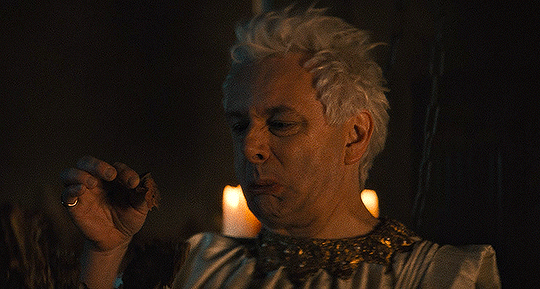
flaunting heteronormativity: Throughout GO but especially GO2, there is very little depiction of heterosexual/romantic couples; most couples are very diverse and no one is making a fuss about it. There is no fetishization of bodies or identities. Just people (and angels and demons) being their beautiful selves (or trying to).
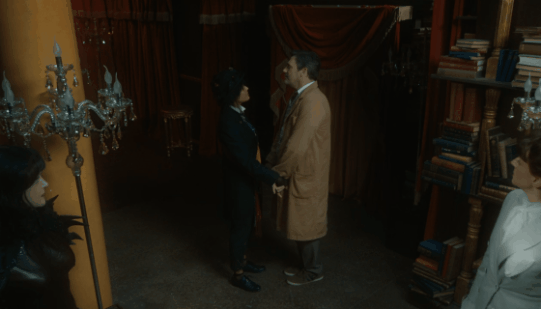
age: Even though Neil Gaiman explained that Crowley and Aziraphale are middle-aged because the actors are, I think it is also queering the idea of romance, love and desire existing mainly within youthful contexts. Male gaze has taught us that young people falling and being in love is what we have to want to see, and any depiction of love that involves people being not exactly young anymore is either part of a fetishized power imbalance (often with an older dude using his power to prey on younger folx) or presents us with marital problems, loss of desire, etc. – all with undertones of decay and patronizing sympathy. Here, however, we get a beautifully crafted, slow-burn, and somehow super realistic love story that centers around beings older than time and presenting as humans in their 50s figuring out how to deal with love. It makes them both innocent and experienced, in a way that is refreshing and heartbreaking and unusual and real.
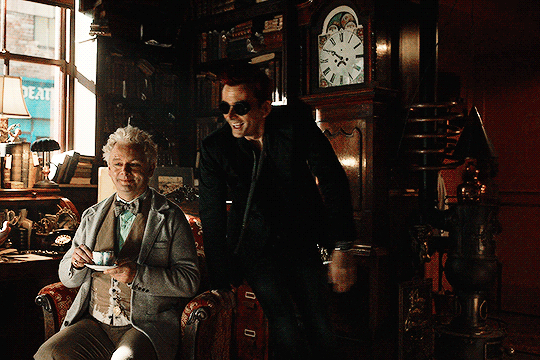
does not (exclusively) center around romantic/sexual love: I don’t know if this is a gaze point exactly but I feel like male gaze and resulting expectations of what a love story should look like are heavily responsible for our preoccupation with romantic/sexual love in fiction – the “boy gets girl” type of story. And even though, technically, GO seems to focus on a romantic love story in the end, it is also possible to read this relationship but also the whole show as centering around a kind of love that goes beyond the narrow confines of our conditioned boxed-in thinking. It seems to depict a love of humanity and the world and the universe and just the ineffability of existence as a whole.
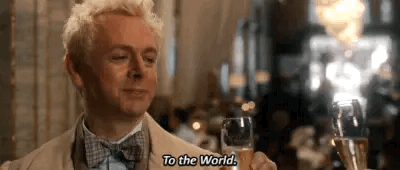
disability as beautiful and innate to existence: Disability is represented amongst angels by the extremely cool Saraqael and by diversely disabled unnamed angels in the Job minisode. Representation of disability is obviously super important in its own right, but is also queers what we perceive as aesthetically and ontologically "normal". Male gaze teaches us that youth and (physical and mental) health are the desirable standard and everything else is to be seen as a deviance, a mistake. By including disability among the angels, beings that have existed before time and space, the show clearly states that disability is a beautiful and innate part of existence.
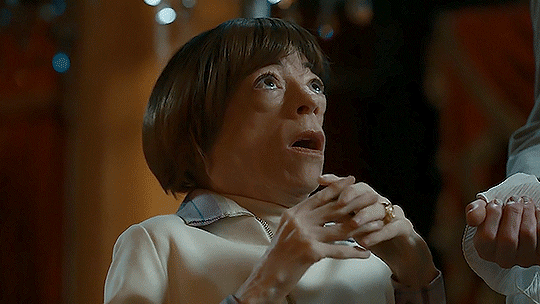
gender is optional/obsolete: Characters like Crowley, Muriel and others really undermine the (visual and aesthetic) boundaries of gender and the black-and-white thinking about gender that informs male gaze. Characters cannot be identfied simply as (binary) men or women anymore just by looking at them or by interpreting their personalities or behaviors. Most characters in GO, and especially the more genderqueer ones, display a balance of feminine and masculine traits as well as indiosyncracies that dissolve the gender binary.
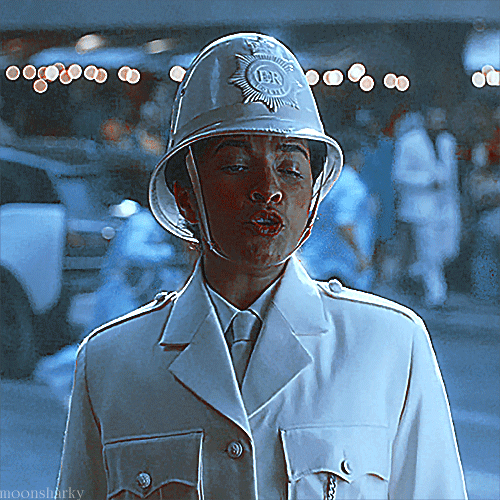
Feel free to add your own thoughts on this in the comments or tags!
#good omens s2#good omens#good omens 2#go2#good omens meta#ineffable husbands#crowley#aziraphale#queer#queer TV#male gaze#thank you neil gaiman for cranking up the queer#neil gaiman#thank you neil gaiman
2K notes
·
View notes
Text
Unpopular opinion, probably.
So I've read many metas, and thought a lot about it and have come to my own personal conclusion about the final 15.
I'm taking it at face value.
Because it was the most human Crowley and Aziraphale have probably ever been and I think that is at least part of the point. Love makes people stupid and they are navigating a very human thing in very unhuman circumstances, and it's hard enough to do as a human in human circumstances!
I think Aziraphale believed the Metatron about Crowley bc he was expecting the worst when TM mentioned Crowley but instead got the one thing he wanted most (him and Crowley together and safe, not Crowley being an angel. ) Crowley was absolutely the carrot here. (and no I do not think Crowley would have been safe or happy, but that's besides the point.) I can't tell you how many times I've believed patently ridiculous things because I wanted to believe them so badly even though if I was looking at the same situation objectively from an outside POV I would see how ridiculous it was, so I totally get it. This isn't to say I think Azi had a real choice to go to Heaven or not and I think he did understand that as well, but I get the temptation the Metatron threw out to him, I really do.
As for Aziraphale literally saying all the wrong things to try and get Crowley to come with him? Um yeah been there done that too, the nerves take over, the brain shuts off, the mouth goes into autopilot pulling stuff out its ass, and "WITAF did I just say?" happens.
Crowley not taking any of it well and only hearing what he expected to hear (I'm not good enough for you bc I'm a demon and you only really want me if I can be an angel) *and* also being more able to see through heavens bullshit bc he has lived it, and can see it from the outside, *and* all whilst being the most honest and vulnerable he has ever been with Aziraphale in 6,000 plus years (or in fact possibly to anyone, ever. the closest before this admitting he was lonely to Azi during the Job minisode,) *then* hearing what he took to be the same Heaven will save us line from Azi was enough to trigger a massive bout of RSD and a broken heart. Everything was supposed to "vavoom and sorted! " and instead the stupid awning broke and everything went wrong. I think I've said it before that at this point Crowley can't hear anything over the sound of his heart breaking into a million pieces.
That's a whole lot to pack into the brief moments before Azi has to leave with the Metatron (who let's be honest was rushing him before he could change his mind) esp when neither of them are used to discussing their relationship openly. They didn't have time to think, to ask questions, to share information, (like hey guess what really happened to Gabriel?) Crowley tried to communicate as much as he could about his feelings with the kiss but Azi didn't have the time to properly process all that and said the wrong thing again and Crowley was rejected (he thought) again and it all just went so very wrong. You can't fix a 6,000 year relationship in 15 minutes, you just can't no matter what the story books say.
It's about two people wanting the same thing but not being able to get it (yet) because of circumstances and personalities. All of S2 was about them seeming to be closer than ever (and in many ways they were) but really they were opposed at almost every turn. (in RL not the minisodes, those actually showed them working together and coming out okay mostly, if you don't count wee Morag or Crowley getting dragged to hell) The way they both handled the Gabriel situation, how they both worked to solve the mystery, even how they tried to make Nina and Maggie fall in love were all either done alone, or in opposite ways. I've said it before and I'll say it again, as it was pointed out right in ep1, their exactlies aren't the same and until they are, they aren't going to be able to be together. The one time they did work together in the season, they produced a 25 lazuri miracle. That is the point of the final 15, and the whole season 2 in my opinion.
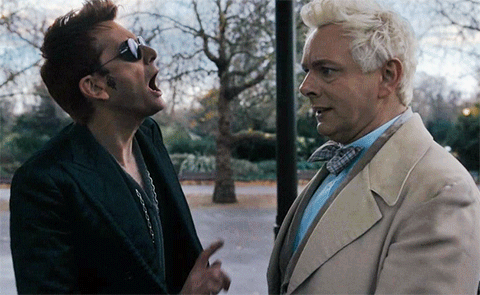
They'll get there in the end though!
#aziracrow#aziraphale loves crowley#crowley loves aziraphale#crowphale#good omens#aziraphale#crowley#ineffable husbands#aziraphale x crowley#aziraphale good omens#crowley x aziraphale#neil gaiman#anthony j crowley#crowley good omens#gomens#good omens 2#az fell#ineffable spouses#final 15#final fifteen#good omens meta#the final fifteen#aziracrow good omens
441 notes
·
View notes
Text
Why Aziraphale is an unreliable narrator
Part 1: The Story of Job
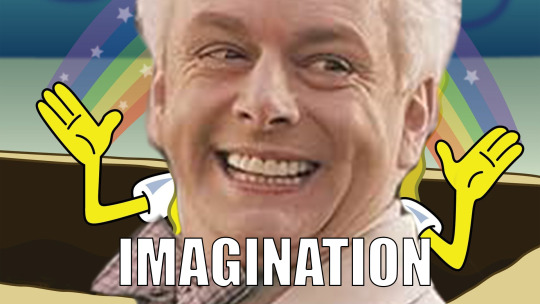
I'm absolutely not the first one to talk about this on here and I probably shan't be the last either. Alas, here's my take on why all of the minisodes in Season 2 should be enjoyed with great care – and taken with a grain of angelic salt.
I'm gonna split this into 3 parts, aka the three minisodes we are shown, since I tend to get a bit waffley in my posts and want to still be able to include all the little details. Once I've written them, I'll link Part 2 & Part 3 here as well!
Alright, let's get into it under the cut of doom.
Episode 2 opens with the Story of Job. Right off the bat, I noticed that it sort of looks like an old film playing. At first I didn't read that much into it, but once we see the cut-away to Aziraphale at the bookshop, currently reading that part of the Bible (presumably), I immediately thought: "Oh! It's because it's his memory. He's remembering how it went down and therefore it plays like a figurative film in his head."
This, I then came to realize, is a very crucial difference to all the flashbacks of S1, which were exclusively told and narrated by God. May her intensions be as ineffable as they are: She did tell us all of these stories from an objective outsider's point of view. Now, however, it's Aziraphale who's re-telling those stories to us from memory.
And if there's one thing that's for certain, it's that a memory is something entirely different to an objective narration of a story. Just think about how you yourself remember things. Especially things that happened years, maybe even decades (or, in an angel's case, millenia) ago. What is it, that you really remember? Can you know for sure, that a conversation was held with those exact words? Are you 100% certain that the clothes someone wore weren't different? Had it really been snowing or would that make very little sense given what you're remembering happened in May? And did it even happen in May? Or does that just happen to be your favourite month, the current weather, your preferred style of clothing and what it was that you would imagine someone would have said to you?
What I'm trying to say is: The further away it is that something happened, the more your brain has to fill in the gaps. This is why, for example, your parents will remember the family summer holiday entirely different when you ask them about it 20 years later.
"No, it was Sarah who puked on the car ride home!" "Nonsense, Sarah never puked as a child. Bobby had that gone-off pizza, he's the one that was sick the whole ride long!"
We've all been there. Bobby made it out alive. Don't buy gas station pizza.
Alright, back to the plot: Naturally, Aziraphale is not actually human, so it is a pure assumption on my part that the way his memory works is similar to ours. However, the whole topic of "memory" is actually quite a recurring one on Good Omens.
Crowley seems to have lost his in the Fall, yet somehow managed to get most of it back. Not all of it, though, he clearly has some major gaps ("You used to jump on me back, little monkey in the waistcoat!"). Beelzebub helps Gabriel store all his memories in their little fly container before they get wiped entirely too, by the Metatron and/or Saraqael. Crowley and Aziraphale (and possibly Jimbriel) perform a miracle together that makes everyone in Heaven and Hell forget who Garbiel is or what he looks like. And we know that the Book of Life apparently has the ability to completely erase someone from existence – ergo also erasing them from everyone's memory and making it is as though the person had never been in them at all.
So, clearly, angels and demons being able to remember, forget, reconstruct and, if you're the Metadork, wipe memories, is very much canon. Apart from that very last one, it does make them quite human-like in a way. We too can forget or (wrongfully and incompletely) reconstruct memories, due to things like trauma, illness or simply a lot of time having passed.
So, just like Crowley remembers going into battle but doesn't remember Furfur being there, or just like Jimbriel has entierly forgotten who he is but still remembers the tune and lyrics to Buddy Holly's song Everyday, and just like archangel Michael was miraculously made to forget Gabriel and yet says "Don't I know you?" when seeing him again – just like that, Aziraphale's memories of the story of Job, the story of wee Morag and the story of the magic show in 1941, might not actually be the whole truth.
So, time to look at where the furniture isn't.
Now, it could very well be that the costume designers of S2 thought: "Fuck it, let's go crazy" – but given that this show has a track record of meticulously making sure to stick to accurate and cohesive character design, doesn't it strike you as odd that Crowley would go from this look at the Flood in Mesopotamia, 3004 BC:
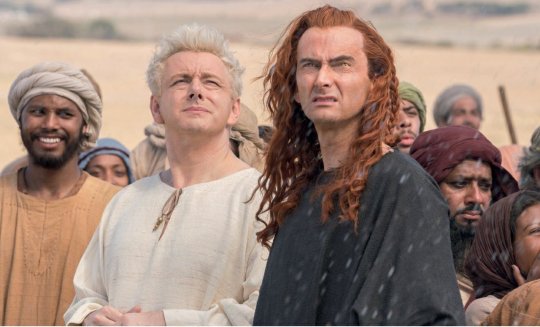
... to the (very iconic, don't get me wrong) Bildad the Shuhuite drip in 2500 BC:

... back to this at the crucifixion of Jesus Christ in 33 AD:
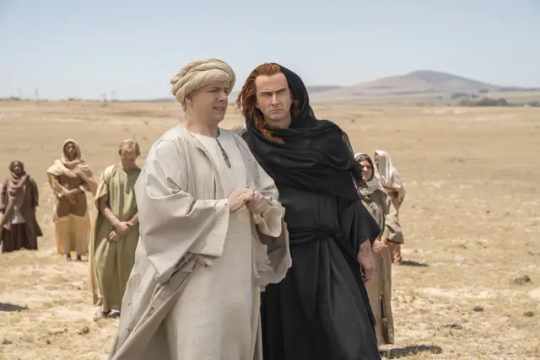
I mean ... I mean– come on, that seems like a bit of a far stretch, even for someone as enthusiastically experimental with fashion as Crowley.
And it's not just that: Where did the sunglasses come from, all of a sudden? And why do they look like some sort of obscure, ancient optometrist's device? It's a known historical fact that the Romans were the ones to have invented sunglasses, somewhere around 50-ish AD. Which actually matches perfectly with when Crowley and Aziraphale meet again in Rome 8 years after the crucifixion (51 AD).
So, where do the weird spectacles come from, over 2000 years too early? Maybe from Aziraphale's brain filling in some gaps? Hasn't Crowley always worn those ridiculous sunglasses? Was it Rome? Or Golgotha? Wessex? Oh, blimey, what does it matter!
And it's not just Crowley: Aziraphale's own clothes, as well as the other angels', seem to be very different from the rather plain linen we see him wear before and after the story of Job.
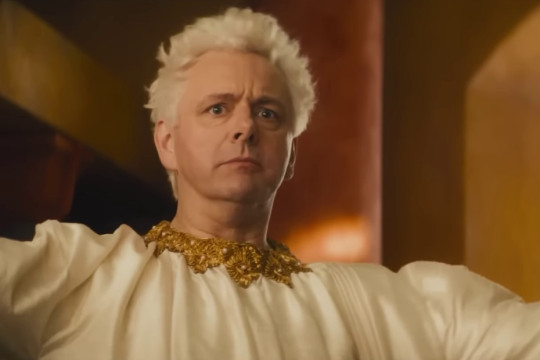
They're laced with golden embroidery along the neckline and sleeves. The remind almost of the clothes angels are depicted wearing in biblical and historical drawings. Ornate and decadent. Not at all like we see Aziraphale in the other flashbacks of S1.
Even Bildad the Shuhite's hair within the minisode keeps changing, going from all pouffy and voluminous to rather deflated and straight-looking:

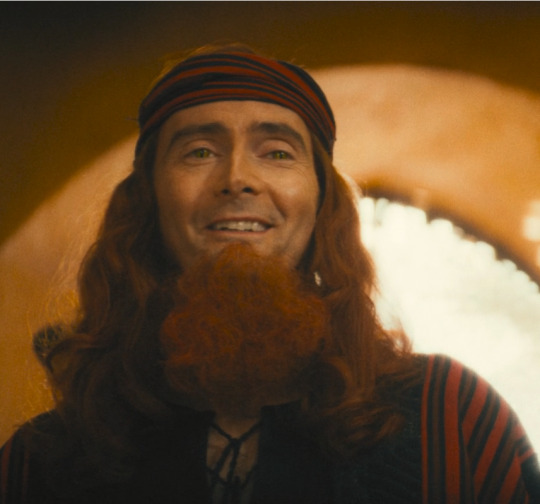
The costume department either had to fix up two seperate wigs or manually straighten out the volume of the one again to give it a more sleek look. I'm not a professional in this field, but if there's anything I've learned from watching hours of behind-the-scenes material of movies and shows, it's that very little about costume, character, prop and set design is purely coincidental.
You know what it could be, though? An accurate representation of how memories aren't linear, historically correct and objective representations of a certain event, but rather an ever-changing, jumbled mess of impressions, emotions and exaggerations.
More specifically: Aziraphale's impression, emotions and exaggerations.
Like "remembering" Crowley with sunglasses because he's been wearing them for so long.
Like "remembering" himself wearing more luxurious, angelic clothes because that's how he thinks of the difference between Heaven and Hell.
Like "remembering" the permit as a ridiculously long scroll that folded out over an entire valley.
Like "remembering" Job's children to be weirdly sassy in an almost Aziraphale-esque way (Enon: "Don't be silly!") for the fact that Job would have probably taught them to be more humble and obedient in the presence of a literal angel.
Like "remembering" eating an entire fucking Ox after having just one bite of it while Crowley watched him lustfully, sipping on his wine.
Like "remembering" Crowley calling him 'angel', despite them having barely known each other back then.
There's a reason why the flashbacks in S2 seem so much more alive, quirky and, at many points, confusing and all over the place. Because they're not objective stories being told by a third party. They're Aziraphale's. So much of his own thoughts and feelings at the time get projected onto them because that's simply how memory works!
It's subjective. It's unrealiable.
It's not that I'm calling Aziraphale a liar. He's no more a liar than your parents are, mixing up Sarah and Bobby. Or you, remembering snow instead of sunshine. Memories aren't lies. They can simply be faulty, focus on things that you thought were more important and leaving out or changing things that weren't, to you.
The real challenge in all of this, is trying to filter through Aziraphale's stories to see what it actually is they're telling us. Where it is that the furniture isn't. And I think in this case, that's 6 main things (eff you, God, I know you like sevens, but I don't care):
God and Satan (still) talk to each other We see that Aziraphale is quite surprised when Muriel mentions that the whole Job thing is God's bet with Satan. But clearly, despite having made him and the rest fall, God still converses with Her number one traitor about whether or not the humans simply love Her because she gives them nice things or because they truly believe in Her.
God and Satan (and Heaven and Hell) can and do collaborate with each other when they feel like it So much for choosing sides, huh? Truthfully, this is not the first time this is shown to us, but still. It's another piece of evidence on the growing pile.
Aziraphale understands the World and humans way better than any of the other angels "Well, you see ... Citis is 58 ..."
Aziraphale, despite having troubles voicing it, absolutely disagrees and even condemns God's plan of destroying Job's children (and goats and camels and––)
Aziraphale is willing to lie and thwart the will of God Also not the first time we're being shown this but again, piiiile of evidence.
Angels don't automatically Fall simply by doing the above To me, this is one of the most important take aways. It's already hinted in S1 as well that 'Falling' seems to have been a one time even back when the first war broke out in Heaven. And I actually believe that ever since then, no other angels have Fallen again. Aziraphale is the best example for this. He has gone against God's plan numerous times and even lied to her very face (voice?) about it. And yet, nothing ever happened to him. Why exactly that is the case remains a topic for another meta (that I might or might not be working on already, teehee).
Alright, that concludes this first look at the Job minisode! If there's anything I missed, feel free to share it with me. I'll try and add Part 2 (the story of wee Morag) and Part 3 (the magic show of 1941) soon.
Update: Part 2 and Part 3 have officially been written, you can find it them right here:
Part 2: The Story of wee Morag
Part 3: The Story of the Magic Show in 1941
Hugs and kisses, (God)!
#good omens#good omens season 2#gos2#go2#good omens 2#good omens meta#ineffable husbands#aziraphale#crowley#story of job#job minisode#good omens analysis#aziraphale is a storyteller#but not a very accurate one#my own meta
942 notes
·
View notes
Text
I love Shakespeare, and I love Hamlet, compound that with the fact that they had Aziraphale and Crowley at the Globe Theater while they were playing Hamlet put me over the moon.
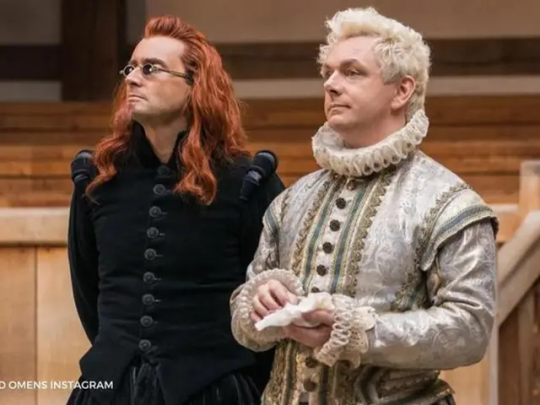
What I find most amusing, is that both Michael Sheen and David Tennant have both played the part of the Danish prince.
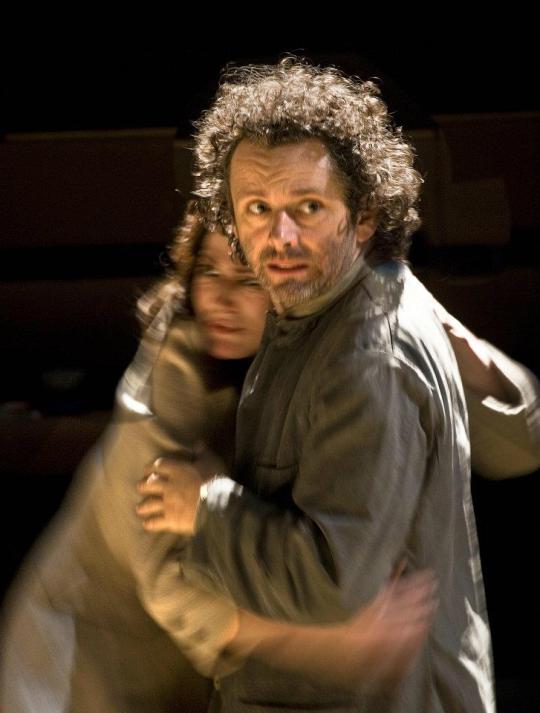
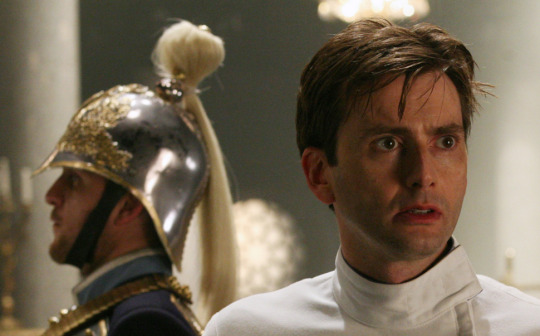
So we have our favorite angel and demon, meeting at the Globe because of their new "arrangement" to do miracles or temptations that are just plain and simple, a pain in the ass to do, but management wants them to do anyway.
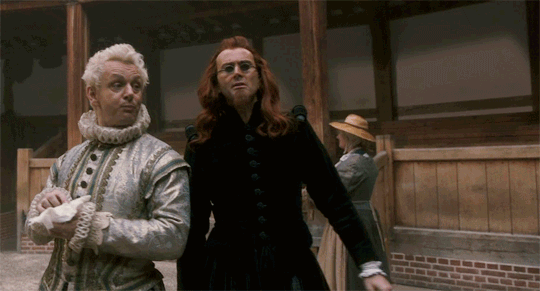
They also discuss the fact that if either one of their sides knew about the "arrangement" it would be abysmal for them. We know what eventually happens to Crowley later on in the future, when he saves Elspeth from attempting to take her life.
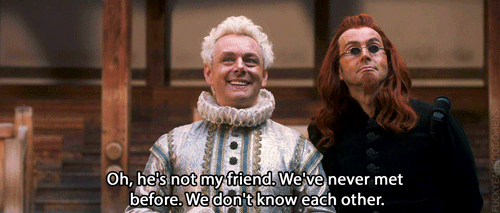
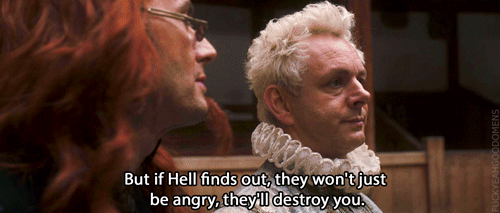
I think the one thing that is key with this part of their history, is how much concern Aziraphale has started to show for Crowley. Even though he denies ever knowing Crowley, he is nonetheless worried about his wellbeing. These are the early stages of their relationship, with Aziraphale voicing his distress at the possibility of Crowley being destroyed if caught by his superiors.

During their conversation, Hamlet is playing on stage, and Aziraphale loves this play. Unfortunately, it's not that popular and it concerns him very much. They then have their coin toss to see who get to do the good and bad thing in Edinburgh.

Poor Aziraphale loses that toss and get stuck having to go there. At this point, Aziphale hears Shakespeare bemoan the fact that no likes Hamlet. This is where Aziraphale gives Crowley the, what has been called, his "heart eyes" looks. I call it the, "oh please my dear, can you do this for me?" look and Crowley just can't say no to him.
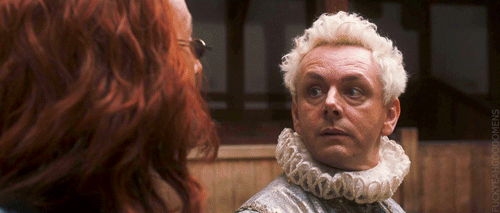
It doesn't even take him a second to agree to his angel's request, so much for putting up a fight. He never has a chance, Crowley already has it bad and doesn't even know it.
I will say, that to me, Crowley fell in love first with Aziraphale. The debate is, when, at Eden or during Job minisode? We can debate that forever, but in the end, he is already in love.


I adore how happy it makes Aziraphale, when his demon capitulates to his wishes. Look at him, he is beaming with happiness, how can anyone not love him.
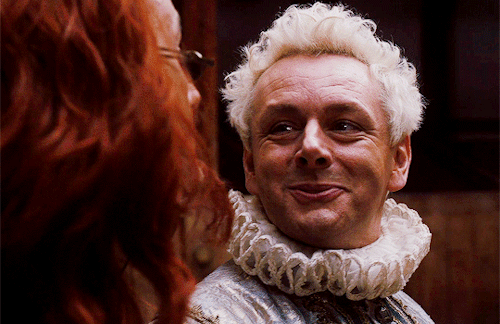
Crowley makes it like, yea, whatever, but you can't tell me he wasn't smiling as he walked away, knowing that he made his angel happy.
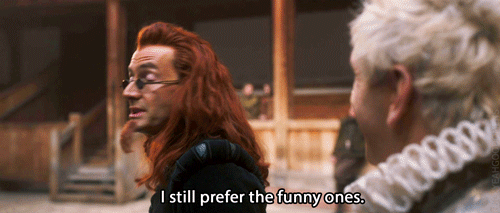
Anyway, I love this whole minisode as I said earlier. It is adorable in their interactions over one of my favorite plays. Plus, Elizabethan Crowley is just gorgeous!
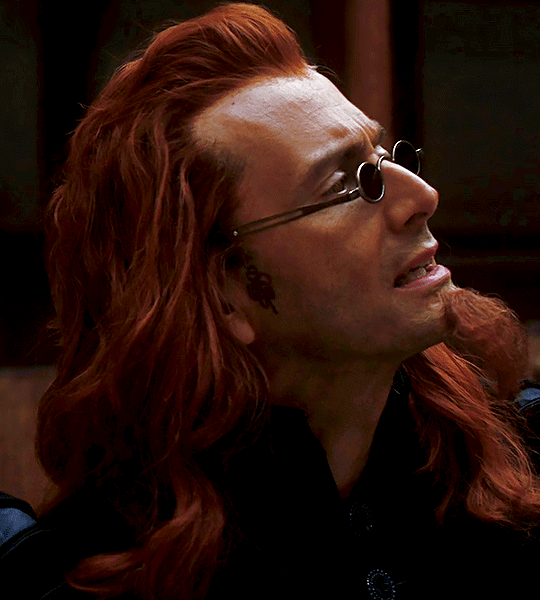
#aziraphale#crowley#neil gaiman#terry pratchett#good omens#innefable husbands#good omens spoilers#aziracrow#good omens season 2#good omens season 1#david tennant#michael sheen#shakespeare#shakespeare plays#hamlet#elizabethan era#elizabethan crowley#elizabethan aziraphale#globe theatre#crowley good omens#aziraphale good omens#crowley x aziraphale#aziraphale x crowley#anthony j crowley#crowley loves aziraphale
809 notes
·
View notes
Text
The Bullet Catch and the Final 15
DO NOT ASK NEIL ABOUT FAN THEORY
Okay, this started as a completely different post. I was writing something else and I had to abandon it because I realized I needed to be writing this instead. It was like a lightbulb moment, or rather, a headlight moment (see what I did there?)
"Banana, Fish, Gorilla, Shoelace, with a dash of Nutmeg." Clearly adversarial forces are capable of seeing what Crowley and Aziraphale are talking about within the bookshop from across the street. It's confirmed the zombies have gotten The Marvellous Mr. Fell's strange magic words correct at the end of the 1941 minisode. Is this foreshadowing the clear observation of the final conversation Aziraphale and Crowley share directly in front of the bookshop window, by the Metatron?
"Aim for my mouth, shoot past my ear". Well if this isn't that damn kiss I don't know what is. And the bullet, the bullet hiding in his mouth. Magicians historically have had keys passed to them through their mouths via a kiss. Crowley sure did aim for that mouth...
"You have formed a de-facto partnership with the demon Crowley." It's a threat, plain and simple. It's the same thing as Furfur showing up in the dressing room with a photograph of the two of them. And what does Aziraphale do both times? He pulls the same fearful face, is terrified for Crowley, and immediately figures out something to quash the threat. Aziraphale is so smart and so fearful for Crowley's safety, he will do whatever it takes, above his own interests to keep him safe.
"Trust me". The bullet catch. God, the stress of this trick, this insane show of trust and love. "You said trust me", "and you did". I have watched season two an unknowable number of times now, and this is still difficult to see on screen, but it's there. Aziraphale mouths, "trust me" and Crowley catches it, and more importantly, trusts him.
This angel knows he's being watched, the love of his life has been threatened, he knows he has no options and he needs to perform a massive trick to save Crowley. Good thing, he always gets it right the time it matters.
Honorable mention: I am an "Aziraphale was trying to signal for a time stop/help to Crowley" truther, here, when it looks like maybe he mimes 'timeout' and "help". I think either Crowley was too blinded by his newfound plan to confess his undying love for Aziraphale to pick up on his "something's wrong voice" or clear non-verbal communication, which we've established this season they are very good at (see Aziraphale asking Crowley to freeze Dalrymple in Edinburgh). OR he did catch the signals and he is LISTENING.

If you haven't read this post by @noneorother about the parallels between The Tales of Hoffmann and GO season 2, you need to. But to snag a small quote of theirs to highlight this one specific point:
"Stella [Aziraphale] arrives in the tavern looking for Hoffmann [Crowley], ready to run away, but now accompanied by Lindoff [Metatron] (dressed as an angelic figure) who followed her. She looks to Hoffmann to save her, but he's too blinded by the fact that he doesn't think she loves him back to pick up on the signal. He gives up, and she goes back up the stairs guided by Lindoff." - @noneorother
Okay but seriously make sure you go read that whole post.
If that isn't what happens in the final 15, what is?
Then we have the end of 1941 pt.2, wine in the backroom, and the reveal of the photograph. Crowley realizes Aziraphale saved him, he realizes how much he can trust him, and if my observed light bulb headlight moment is anything, it happened after the final 15 too. He knows. It's still devastating, it's still heartbreaking, and it doesn't invalidate all the feelings and love they couldn't quite come out and communicate right then. They are living under an Orwellian regime, this isn't really a job they can quit or even run away from. They were angels created for a purpose. Sure gabriel and Beelzebub left, but how long until someone tries to hunt them down? Plus, what's the point if Crowley and Aziraphale abandon Earth and just let armageddon part two happen? That's a pretty shit thing of them to do. They want to live on Earth, they want to protect the humans, and they want to do it together.
They didn't eat the apple, the humans did. Maybe at the end of season 3, they'll get their chance.
#good omens#crowley#aziraphale#crowley x aziraphale#good omens meta#michael sheen#david tennant#good omens 2#good omens clues#good omens theories#good omens theory#good omens 1941#good omens bullet catch
166 notes
·
View notes
Text
OKAY SO I have a theory about the Aziraphale/Crowley relationship progression but it is going to have some pretty significant SPOILERS for E1-2 of Good Omens S2 so be warned!
By significant spoilers I mean that I will be describing some specific moments across both episodes (which I saw at the NYC screening).
Theory is below the line-
Alright, so as most people already know- I think from an interview- in the opening scene where Crowley and Aziraphale are both angels, Aziraphale notices Crowley before Crowley notices Aziraphale, and Aziraphale is clearly struck by Crowley. I don't know that I'd say "in love" but I think that it's somewhere in a range from "admiring" to "infatuated."
There are a lot of people theorizing about how that could possibly mesh with the S1 truism that Crowley fell fast for Aziraphale and Aziraphale kind of ignored him but I actually think it works perfectly well if you look at it this way:
Aziraphale fell for (for lack of a better term lol) the angel Crowley had been before.
So when he’d have seen Crowley in Eden, Crowley would recognize him as he looks exactly the same and really it's only been seven days, but Aziraphale would see a demon who COULDN’T POSSIBLY BE THE SAME BEING HE FELL FOR!
On rewatching the Eden scene, I think that Aziraphale does recognize Crowley as the angel who fell- he just doesn’t know his new name- and while obviously this is basically just me projecting back on performances that didn’t have ANY of this in mind, he seems very on edge when talking to Crowley. It’s like he knows EXACTLY what led Crowley to fall (asking questions and criticizing God), Crowley’s doing more of it now, seemingly to tempt Aziraphale into falling (especially now that he’s a demon and that’s what demons do, it’s what Crowley just did to Eve), and so Aziraphale is trying to be very careful. It’s why Aziraphale is so freaked out when Crowley points out that maybe he shouldn’t have given away the flaming sword, and that it wouldn’t be good if actually Aziraphale did do the bad thing and Crowley did the good.
Aziraphale needs to have done the good thing so that he doesn't fall and end up like Crowley, the angel who he fell for (figuratively....) and who has met this fate and turned into a totally different being! He’s seen exactly what happens when you’re a powerful and well meaning angel who just has some questions about god’s plans! I believe strongly that Aziraphale had believed that Crowley AS AN ANGEL was good and worth falling in love with, but that Crowley AS A DEMON is a different being who cannot be seen in the same way.
Then at the ark, its Aziraphale’s side that is doing the atrocity so it’s the typical defensiveness, continuing with the whole “well he’s a demon and even if I kind of agree with him he can’t be GOOD the way he was when he was an angel, and that means he must be bad and wrong even if his points make sense.” Crowley is a demon now, and demons are bad, even when they FEEL right- and if Aziraphale goes after his natural inclination which agrees with Crowley, especially if part of that is because he remembers what he felt about that angel of years ago, it just means that he's being tempted by a demon...
AND THEN we get to the Job minisode. I loved the minisode and so I'm hesitant to really spoil it but basically Crowley yo yos back and forth- first he seems very happy to do terrible things to Job, then it turns out he's been partially defying that order (which incidentally means going against God's plan, which is a VERY big problem for Aziraphale!), then he concocts a plan that requires Aziraphale, for good reason, to lie to the other angels, including some archangels, thereby counteracting God's plan. Afterward Aziraphale freaks out because he thinks that lying in order to trick Heaven and God means he’s fallen, and Crowley has to explain that that’s not how it works and comforts him.
Aziraphale is conflicted, of course, because Crowley is confusing and can't really win- on the one hand, it's bad if Crowley listens to God and kills Job's kids, but on the other hand it's bad if Crowley DOESN'T listen to God and DOESN'T kill Job's kids! So Aziraphale is expecting much more than Crowley is ever able to live up to- he's muddled about his purpose, and Aziraphale doesn't know how to interpret that.
I feel like this would kind of put the tin lid on it. Crowley is a different being now, one who may still have merciful qualities that Aziraphale likes and agrees with (and may remind Aziraphale of that angel of long ago) but is still a demon and against everything that Aziraphale is meant to stand for. And while the minisode ends with Aziraphale understanding that he's not quite like the other angels, he is still very clear- he is an angel and Crowley is a demon. They aren't just enemies, they are incompatible. The Crowley in front of him and the Crowley (or whatever his name was) that he remembers from heaven are different and he can't trust the one in front of him.
Because it feels like that's the main barrier here- Aziraphale can't trust Crowley. Crowley is a demon and his object is to tempt humanity to its downfall, even if Crowley himself isn't always so into that. Aziraphale may like Crowley, but it's against his better judgment- every bone in his body tells him not to trust him. He can't trust that Crowley's intentions are genuine- also in the minisode, Crowley tempts Aziraphale to try food (or as Gabriel would call it "gross matter") for the first time, and Aziraphale is somewhat disturbed by this in part because he knows that he is susceptible to Crowley's temptations! How can he trust after this that anything that Crowley does for him or says to him is done with good intentions rather than to bring him down from where he thinks he should be?
It's the Arrangement that ends up changing this. Having an agreement where they each do things for each other, each against their own better judgment, slowly but surely encourages Aziraphale to trust Crowley and his intentions. And it's during the Blitz, when Crowley puts himself in danger to help Aziraphale (danger that is specifically caused by the fact that Crowley IS a demon- otherwise the church would hold no danger), that Aziraphale really realizes that Crowley does have good intentions. He put himself at risk, which is the furthest thing from trying to get something for himself. This allows Aziraphale to trust Crowley that he really does need the holy water for a good reason, among other things later.
As you can tell, I don't actually think that Aziraphale has ever been oblivious to Crowley. He sees everything, but interprets it through his own mental lens. (The parallel that came to mind for me, weirdly, and you can ignore this if you've never seen the sitcom Frasier, but Daphne would have to be wearing massive blinkers not to know that Niles is into her- it's just that she doesn't recognize what kind of feelings he has because in her mind they are in two different worlds and so the idea that he could be genuinely interested is out of her comprehension.) To Aziraphale, Crowley is intriguing and kind and he's thought so since the beginning, but he's also dangerous. In fact that's what makes him dangerous!
Crowley is dangerous because there is so much about him to love, but he is a demon and therefore, in Aziraphale's worldview, unlovable. A demon can't love and be loved! And so Aziraphale is really also not just not trusting Crowley, but also not trusting HIMSELF. He has all these feelings about Crowley but he keeps saying that they're just Crowley tempting him or just residual feelings from the version of Crowley it WAS permissible to love, the angelic one.
I think that Crowley may genuinely be oblivious to anything Aziraphale is feeling, because in the opening scene he isn’t paying a tremendous amount of attention to Aziraphale, but I think he does grasp that Aziraphale doesn’t trust him and that’s what he’s working to change. He knows it's an uphill battle and the most important thing to do in order not just to change their relationship but to get Aziraphale out of his funk.
Now that they're both "on their own side," Aziraphale has a lot more understanding. He sees that just because Crowley is a demon it doesn't mean he is untrustworthy, and he realizes that each of them independently needs to make themselves worthy of trust and Crowley has done that again and again. And so it's almost natural for him to go back to those feelings that he had for that original angelic Crowley, but reinforced by everything he's learned since then- millennia of Crowley proving his ultimate goodness.
As a character in one of my favorite novels, Dorothy L Sayers's Gaudy Night, said of another character (paraphrased), "if I should once give way to him, I would go up like straw." And indeed she does. Aziraphale does too- once he opens himself to fully trust Crowley he can feel that sense of peace and security between them, and fall right into it, in a way that Crowley, who's been working so hard to establish it up until then, can't really. Crowley's been on edge for so long that he can't take anything for granted; Aziraphale can.
#good omens#good omens 2#good omens spoilers#good omens 2 spoilers#go2 spoilers#go2spoilers#spoilers#gos2 spoilers
336 notes
·
View notes
Text
How much Aziracrow can we hope for? (I did the maths)
tl;dr It's 17 minutes.
I went over both seasons of Good Omens over the past few days and I wrote down how much screentime Aziraphale and Crowley have in them. Then I did some maths…
*Btw. I've rounded my equations for clarity because I reckon tiny fractions don't matter that greatly. I have a whole excel chart with the scenes length counted in seconds and meticulous calculations based on that if anyone wants to see.*
I'll start with season 2 because it has spoiled us rotten. The season (without the opening and ending credits - though I did include e6 credits up to the point where their faces blur out) lasts 259 minutes. The scenes with Aziraphale and Crowley take up 118 minutes of that. That's 45.5%. If you apply that number to the 90m, you get:
90*45.5% = 41
Forty one minutes of Aziraphale and Crowley's shared screentime. Depending on how you take it, it doesn't sound like much (in fact it's 21 minutes less than all their screentime in the minisodes), but it's like an entire season 2 episode made up entirely out of their screentime.
Except…
Over a half of their screentime (62 minutes to be exact) in s2 is in the minisodes. And, let's be real, we're not getting any of that with just 90 minutes to tell the story of another Armageddon't. So! Season 2 minus the minisodes is reportedly 142 minutes. 56 minutes of that are taken by Aziraphale and Crowley in scenes together, which gives us 39.5%
90*39.5% = 35.5
That's roughly 35 minutes 30 seconds. Still doing okay with that? You'd better, because we're about to leave our sweet delululand.
Season 3 was never supposed to be like season 2. That was our "gentle, quiet and romantic" intermission, a backdoors prologue to the final season. Season 3 was always supposed to be like season 1: another mad-paced stop-the-apocalypse narrative. Just like the majority of season 1 focused on Adam and a plethora of side characters that had a role to play in stopping the Armageddon, the 90m will have to tell the story of the Second Coming and show how those characters move across the board towards stopping it (let's remember that Shadwell is low-key confirmed to return, so yes, we are getting thost side characters and each of them will need screentime); as well as the child of god themself, of course.
So, let's look at the numbers for s1 instead. Season 1 lasts a little over 306 minutes (again, minus opening and ending credits). The scenes with Aziraphale and Crowley take up 73 minutes of that. That's 23.8%.
90*23.8% = 21.5
Twenty one minutes and thirty seconds. Ouch.
Unfortunately, we're not done yet. 30 minutes of Aziraphale and Crowley's shared screentime is in the first half of e3 (the much-loved through-the-ages sequence) and the second half of e6 (the body swap plotline) - both of which only found their way into Good Omens because there was time left. The scenes in total last 56 minutes (btw I decided to count in the whole epilogue, minus the Ritz, even though a lot of it shows the aftermath for other characters - if I'd counted that into the "main" season, seeing as a lot of it is in the novel, the numbers would look even worse), leaving 250 minutes of the actual season 1. The scenes with Aziraphale and Crowley now take up a bit under 48 minutes. That gives us 19%. So, ready for the final equation?
90*19% = 17
Seventeen minutes of Aziraphale and Crowley's shared screentime.
That's less than 2/3 of the through-the-ages sequence. It's roughly as much as there is of them in s1e1 (only the episode itself is 47 minutes long - it's the second most Aziracrow-heavy in all of s1).
And just so we're clear, when I jotted down the scenes to include, I took ALL scenes that have both Aziraphale and Crowley in them - not only those that are about them, when they are talking or otherwise interacting, focused on each other, but also e.g. when Crowley talks to Gabriel and Aziraphale stands in the background, or when they bring back Job's children. I did that because MS and DT are brilliant actors and I firmly believe they can saturate each such scene with love and longing so much that it'll leak off our screens. See? I can be quite the optimist.
So yeah, enjoy your New Year and the upcoming 6 weeks of filming, I guess.
#good omens#aziracrow#good omens 90m#good omens season 3#not really a season just tagging it for ranges#good omens deserves better#happy new year
20 notes
·
View notes
Text
"What the hell did you just do?"
Part 2 of whatever. Continuing on with Tadfield Manor scenes, we get to the infamous "Wall" scene. I know it has been analyzed by many so far, but that's never stopped people in the world of literary analysis from spewing their own thoughts on well-reviewed texts. Also, I just want to.
Okay, so once they enter the manor building and see the management training branding, Crowley decides to "help out" and make all of the paintball guns into real machine guns. He snaps his fingers and points double finger guns at the passing "soldier".

Aziraphale is dumbfounded. "What the hell did you just do?
Such language, Angel! And no physical reaction to it like Crowley did when he said "Heaven's sake" in E6. Huh.
Crowley, meanwhile, is thoroughly pleased with himself. They want to battle? He's happy to oblige.
This plus the scare in the courtyard lets us see Crowley enjoying the few perks of being a demon. It's fucking adorable.
Aziraphale cannot comprehend how Crowley - who just miracled a stain away on his coat because it bothered him - could do something so thoroughly evil. And with a jaunty step!
If Aziraphale had pearls, he'd be clutching them so hard.
To which Crowley takes the opportunity to once again point out the flawed binary system of morality. We the audience will see this argument again in the Body Snatcher minisode, so it's fun to see how these two keep having the same old debates throughout time just with different causes with which to start from.
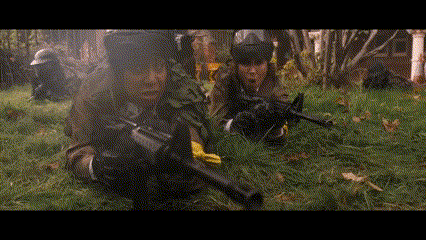
Pointing out hypocrisy while slinking down a hall? Crowley, you delicious tramp.
Aziraphale is still thoroughly horrified, but Crowley concedes with a sigh that everyone will, in fact, be fine. To me, his tone is a mix of disappointment at him not being quite as much of a bastard as he paints himself. He can't really hide his true self from Aziraphale.

I love how he can't stop moving his body. Snakes gonna slither.
Then here is it. The big moment. Smug little Aziraphale feels the need to mention how nice Crowley is underneath his demonic persona.
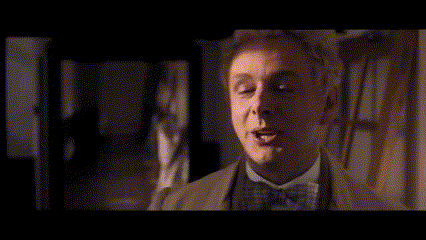
We now know that this is a reoccurring exchange, where Crowley must defend his title of Big Bad Demon in front of Azi's kind compliments. There's serious consequences to Crowley being labeled "nice" and Azi knows this by now. So why does he keep bringing it up? To provoke Crowley? To finally break him into admitting Azi is right? It's not like Azi can protect Crowley from Hell's wrath, but he pushes anyway.
I thought Crowley was the shit-stirrer in this relationship.
And now my favorite part. Sister Mary shows up and rightly implies these two are about to nail each other through the drywall. But when she recognizes Crowley, he stops her in her tracks.
The sass! It's off the fucking chart! Only an Angel could withstand such a display!
Aziraphale just straightens his clothes and lets the sass go unchallenged because he's still has a bit of self-preservation instincts left.
So I already talked about the "Luck of the devil" line from Aziraphale here, but it truly is a fun moment in the context of the whole scene. Crowley is worked up from the "nice" comment and Aziraphale's seeming refusal to stop analyzing him.
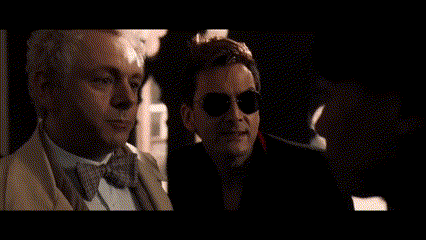
Horny Aziraphale is sassy and Crowley looks like he wants to bite through a door frame.
So, obviously, I've spent way too much time rewatching these scenes, but I do find it so interesting how we see so much of their relationship on display within just a few minutes. The different personality traits to draw them together while also pushing them apart.
The way Aziraphale knows how to work Crowley, who in turns knows how to indulge appropriately. (*cough* bullet catch *cough*)
The way Crowley happily taps into his demonic toolbox to spread a bit of chaos without actually causing serious harm. (*cough* Job *cough*)
The way Aziraphale reflexively tows the party line of Heaven even in the face of Crowley's demonstrations of humanity's instincts. (*cough* all of time *cough*)
And basically the way they bring out the best (and sometimes worst) of each other. Some might say they're a team. Or a group. A group of the two of them.

#good omens#crowley x aziraphale#crowley#aziraphale#ineffable husbands#david tennant#michael sheen#aziracrow#aziraphale x crowley#good omens meta#the cutest chaos goblin#luck of the devil#sassy aziraphale#supernatural sass#microcosm of the universe#nice is a four letter word
176 notes
·
View notes
Text
Resurrection and The Second Coming
There is a recurring motif in season 2, and that is the image of resurrection and being raised from the dead. I think this all points to what will happen in season 3 and tie into the Second Coming plot that was mentioned by Metatron. I’m not sure what exactly it’s indicating, obviously, but here are the clues:
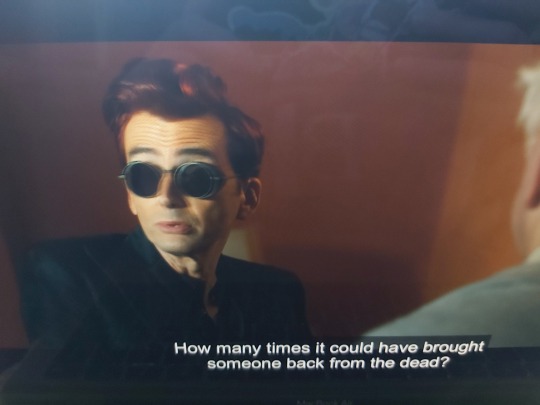
1) 25 Lazuri miracle
I enjoyed the reference to Lazarus, and I found it quite striking! It IS interesting, isn’t it Crowley, that Heaven measure miracles by how many times it could have brought someone back from the dead?
And isn’t it interesting that Aziraphale and Crowley, combined, could bring back 25 human lives with a single, half-arsed miracle?
I’m getting the impression that bringing people back to life and the power to resurrect is going to be a bigggggg deal in the future plot.
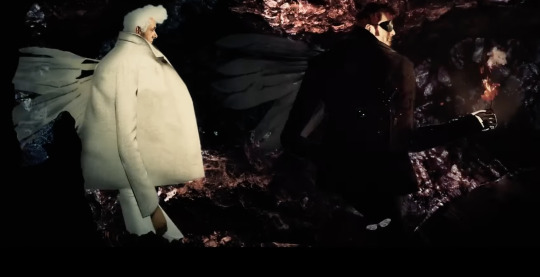
2) The opening credits
The opening credits have been said to hold a few clues for season 3. One of the things I've noticed is that there’s plenty of apocalypse and hell imagery, none of which we see in season 2. For example, above, we see A and C moving underground, like they’re navigating some route to the underworld. Then we see them leading a growing crowd of people through a very traditional portrayal of hell, with fire and giant spiders etc., through the blitz, through a SPACE (?) and a very modern perspective of the apocalypse, with scrapheaps and riots.
There’s a LOT to unpack in that, but what I want to focus on here is the concept of the afterlife. We’re presented with an almost Dante-esque, Ancient Greek view of Hell: A and C are walking through dim tunnels to a fiery, wretched view of the underworld. Where is this??? In the show, I mean??? We’ve never seen this version of hell. as far as we know, it has always been the bureaucratic landscape that we’ve seen in S1 and S2. We can assume it’s always looked like this because Heaven has always had the office-style setting since even Job’s time.
So what are we seeing here? A and C leading people to Hell? Then... walking out of it!? It is very reminiscent of the ancient myths of Greek heroes attempting to bring the souls of their loved ones back to Earth.
And, notably, we do not see either of them walk through heaven in the opening credits.
Who are they leading through this opening credits scene and why?

3) Give me Coffee or Give me Death
I don’t actually have a lot to say about this other than there was a lot of emphasis on the name of the shop. Possibly just because it’s a fuckin’ cool name for a cafe... but even Metatron makes a pointed remark about it.
Call me a tin-hat bitch, but I actually have a feeling that Nina, who is sooooo hyperaware of all the bizarre events going on around her-- to the point that she’s lucid at Aziraphale’s party-- is an angel. I think she was removed from the Book of Life, so no one knows she ever existed as an angel. She seems to have some connection with the supernatural, with Sight, and perhaps, given the name of her shop, the afterlife.

4) The Resurrectionist and Mr Dalrymple
The whole minisode of The Resurrectionist was bizarre-- I really enjoyed it, but it does make 100% sense that it’s referred to as a minisode. Because it feels oddly separate from the plot (until of course we find out the connection with Beelzebub and Gabriel). Even then, though, it’s a little jarring.
WHY this particular flashback in history?
And WHY do B and G meet there in the first place? Out of all the places for them to meet in the universe?
This is another rather heavyhanded hint towards the concept of resurrection and being raised from the dead. Mr Dalrymple, ethics aside, is using the dead to bring life to others. He’s giving the dead a new lease on life.
And, listen, I’m a fan of the classics, so the connections to Shelley’s Frankenstein is VERY blatant-- bringing in the question of morality and playing god and the creation of life and modern prometheus and responsibility and resurrection etc. AND Dr Jekyll and Mr Hyde. (The latter especially in the sense that Stevenson was a doctor from Edinburgh.)
I just think the minisode is another example of a thread left untied in season 2.
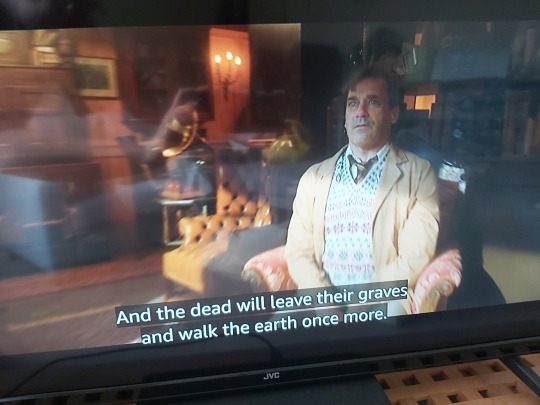
5) Gabriel’s prophecy
“I remember when the morning stars sang together and all the angels of god shouted for joy.” (A reference to Job, see below)
“There will come a tempest and darkness and great storms. And the dead will leave their graves and walk the earth once more. And there will be great lamentations. Everyday is getting closer.”
I mean, what else is there to say here? This is explicitly a prophecy about what will happen later in the story-- the dead returning and walking the earth. This HAS to be a reference to the Second Coming, which I talk about more in point 9.
What if this is hinting at a giant rehaul of heaven and hell? The living and the dead facing true judgement?

6) Zombies in the blitz
Have any of you noticed that we’ve seen plenty of Heaven and Hell, but the only time we’ve ever seen any signs of human beings in said afterlife is with the Nazis? It only occurred to me while piecing this post together, but we’ve never seen anyone in heaven aside from angels. No saints, no good people who went to the good place. In hell we’ve seen lots of shuffling people, but honestly I’ve always thought they were demons. Now, we’re seeing the check-in process in Hell, which I thoroughly enjoyed, but... it’s just occurred to me that it’s the only time we’ve explicitly seen any human afterlife in hell rather than just demons.
What does it mean? Not sure. Perhaps it’s hinting at what will occur in season 3. Perhaps it’s suggesting that there is a major fault in how heaven and hell actually organise human afterlife. Maybe the system is broken beyond the institutional abuse we’ve seen among the angels and demons...
ANYWAY.
Zombies are undead. Life resurrected. Lazarus kinda. Right? Obvious connection. But what *is* interesting is that these Nazis specifically were resurrected as a part of the plot to survey A and C. Out of all the people to bring to life... they are a pretty depressing and unsettling choice. Even if they’re like, comedically terrible/evil. Eek.
Lazarus, after all, was supposed to be a good guy. (I think. Jesus brought him back to life after all.)
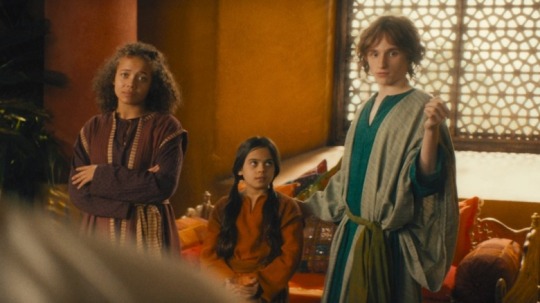
7) Job’s children
The various versions of this story I’ve looked at have been fantastically vague about what Job heard and what happened to him at the end-- which is, I gather, the whole point. The message appears to be about having faith in God. It’s a test of faith and love for the Almighty.
But like, even the idea of the children being returned to life is vague. In some versions it looks like he gets his original kids back plus more, in others, it’s not specified. In this version, we see Crowley’s kindness in saving them in the form of metamorphosis (at least temporarily). Job’s children aren’t brought back to life as such, then, but they are returned to Job. In a way, the whole of this series is bringing stories back to life by retelling them on the screen. (Stop it, I know it’s a stretch...)

8) Magic tricks
Ok, so the most famous magic tricks in the book are the idea of DEATH EVADING ESCAPADES! Such as sawing a body in half. Or, in Aziraphale’s case, the bullet catch.
I dunno where I'm going with this, but it feels relevant. Especially given that there’s the whole scare of ‘oh no we can’t use miracles! I could be discorporated! Then there’s all the paperwork... for RESURRECTION...’
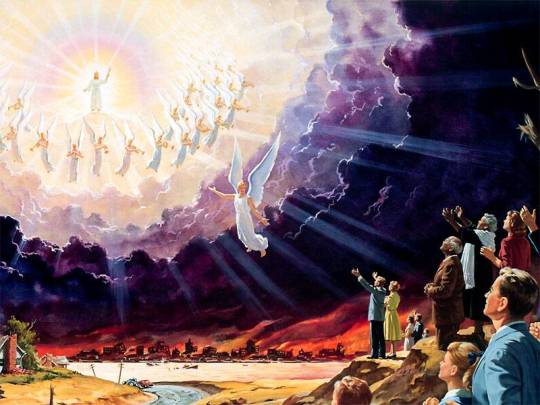
9) The Second Coming
So, I am not all too familiar with the Second Coming. It appears across various religions and interpretations of the scripture.
My understanding of it is LIMITED even after research, so I would appreciate others chipping in if they can clarify for me and for others.
- It involves Jesus returning to Earth (often during a time of war and destruction among humans, though not in every religion).
- Jesus’ second coming to Earth will trigger Judgement Day. The living and the dead will be judged on whether they go to heaven or to hell.
- Some Jehovah’s Witnesses believe that the second coming of Jesus occurs after Armageddon and brings the ‘conclusion of the system of things’. A giant rehaul, I think.
- For Catholics, the second coming will cause ‘the fullness of the reign of God and the consummation of the universe and mankind.’ What this essentially means is that mankind and the universe get to share in Jesus’ resurrection, so the dead will walk again. Just as God manifested himself through Jesus once, now, God will appear through the whole of mankind and the universe. Personally, I've always appreciated this interpretation of God-- that the Holy Spirit is everywhere and in everything, rather than a person in the sky.
- Catholics also believe that “at the moment of Jesus' arrival, three events will happen all at once in an instant, in the blink of an eye: the living will die, the universe will be transfigured, and the dead will be resurrected, judged, and recompensed. After this single instant or moment, the church does not know what will happen for the rest of eternity - only that the damned will continue to be in hell and the saved will continue to experience the beatific vision.” (thank you Wikipedia)
- Most religions see it is as the final true judgement of God over mankind.
Conclusions
I don’t know what it all means, but I think it all boils down to the Second Coming, the final judgement, and perhaps a big reshuffle of heaven and hell.
In my opinion, Heaven and Hell as we know it in the show will be completely deconstructed and reconstructed. I think perhaps Metatron has been the ‘man behind the curtain’, an imposter meddling with mankind, their prophecies, and even the Book of Life.
Perhaps, all of these little hints are an example of Metatron’s ‘Second Coming’ plan bleeding through whatever reality we’re in.
238 notes
·
View notes
Text
Clothing Within Ranks
(Many people have made wonderful color analysis about good omens before me and I’m going to try and link where needed but I know l'm going to miss some so just know I am sorry about that - it’s not intentional)
What I wanted to get into today was what these colors mean for our characters, their ranks and roles, specifically Heavens uniforms over the years. I'm also only going to talk about the times we see more angels than just Aziraphale (and probably not even going to do a section on him here because that could be a whole post on its own) - one for comparison reasons and two this is already going to be quite long without getting into every single Aziraphale outfit
When going into this I was trying to look for why these angels were displaying these specific colors - what is an in-universe explanation? - what do these colors mean to Heaven? - what is with the big clothing changes throughout the years? why put these colors on clothing - making them physical instead of just atmospheric?
and I’ll admit I struggled with this and almost just gave up on it but I knew it wouldn't leave me alone so I pushed through and shout-out to these here metas that kept me sane and were my jumping off points but without further ado strap in it’s going to be a long one and let's just get into it.
We are going to start all the way back Before the Beginning because although there is not much to go off of (and going to be totally honest this is mostly just a crack thought but I figured why the hell not) there are still differences in their outfits, which I have touched on in a previous post. To summarize the difference is in the sleeves - the cut on Aziraphale’s sleeves are wider while crowley's have a more straight cut - but that is not what I wanted to touch on today, it's the placement of the gold on their sleeves. Aziraphale has the gold, which I should mention that the design on both them is the same, on the bottom of the sleeve but Crowley's is higher up by a couple inches.
Now this got me thinking about how the atmosphere of Heaven would have been before the War and this could just be me but I don't imagine there would a big need to show off rank - and I do believe they had a different ranking system during this time but that is a whole other thing - yknow it would just be something small nothing to really show off. Now we know that Crowley was probably a high ranking angel so to combine all this - what if how high the gold was on the sleeves was the indicator of how high they were in rank? I know that Aziraphale is not the lowest ranked angel but what if at the time he was? I mean he was referred to as a cherub here - which has been explained as just a young angel. Anyway this was mostly just a fun little thought.
The next time we see multiple examples of Angel clothes is in the Companion of Owls minisode and we get a lot of them. Now it has been pointed out before about how the gold embellishments are meant to show off their ranks as angels here - which is a great read so go do it - it really goes into the detail and it is probably easier to just go read it than me trying to summarize.
But why is this such a big difference from literally everything we have seen before? They are big and over the top and really showing off their status. For angels they really seem to be leaning into their pride for this whole story - just a visual way to show Heaven is not as good as they project - it’s giving when royals are just letting other people do their dirty work and when confronted about them sitting in their riches while their people suffer and they say “well what are we supposed to do about it?”
I also find it interesting that literally every other robe outfit we see from Aziraphale they are way more simple, almost like he has different outfits for when he is on a job and then when he is trying to blend in and live among humans - which just opens up a lot of cans
Lets fast forward to more modern times of season 1 and 2 to see how much things have changed and take a look at each angel individually (and the actual reason i wanted to do this post)
Gabriel

His main outfit consist of a gray suit with a white shirt and purple tie and tan shoes. He has some variations with a long gray coat and a gray turtleneck and scarf but we are really just going to focus on his main outfit. The gray is pretty straightforward as the color of archangels but the fully gray suit is specific to this council/leaders of angels. The purple tie is where it gets interesting though. Initially I thought it served the same purpose as his purple eyes, just as a way to show his rank as Supreme Archangel until purple showed up in other angels outfits also in places around their necks. So I had to look into what those angels did and how this would fit into what is essentially a government system. So yes this tie does symbolize him as a leader just not in what you expect.
I will get into the two kinds of base angels later but right now we are going to have to dive a little deeper to understand what the purple means - it is a job. I am proposing that the purple is an indicator that angel is a part of an intelligence/legal department in Heaven and because Gabriel has a solid purple tie instead of it in tartan, he is the leader of them or he at least is the angel they report to. It is a home for our creative angels, the ones making the plans. I will get into why the other angels fit into here when I talk about their outfits but as for why with Gabriel well lets look at his character (his season 1 character at least).
As Supreme Archangel he would need to be the angel that knows the most about what was going on, he very much wants to stick to the agreed upon plan, he spreads information around to make sure everything is going to said plan, and he very much does not want to know anything about the "illegal” back-channels that Heaven may have. These are just a few broad examples but it is worth something to look at. Now to understand the white and tan in his outfit we are going to have to move on to the rest of our gray suits - just remember he is the leader of all angels.
Michael

Their outfit consist of a gray suit and a white frilly shirt with white shoes. The gray suit is of course for their archangel council rank but what is with just the white? White is thought to be just the base color of angels and I think is was but it has changed a little. As the concept still fits with what I am about to propose - it is now just one of the two base kinds of angels.
I'll admit their outfit tripped me up so took a step back and looked at it backwards and it was Muriel that actually helped lock this in. Muriel starts out in a tan outfit but changes into a completely white officer outfit to complete a job - a job to blend in, observe, and confirm and it got me thinking of the actions we see Michael do. They are the one to get pictures of Aziraphale and Crowley, they are the back-channel to hell, and they refer to themselves as a duty officer to name a few.
So to put this all together I think the White is meant to show the angels that are for surveillance - to watch over and observe humanity - kind of like a civil service. Michael is the leader/representative of these angels and that's why the white is so big and frilly to show off this position instead of just a simple shirt.
Uriel
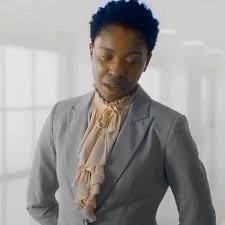
Their outfit is very similar to Micheals with a gray suit and solid color shirt underneath though his is tan. Again the gray suit for their archangel council rank and with the new addition of tan.
So after taking a look at the angels that wear tan Uriel, Sandalphon, Aziraphale, and a few background angels let me introduce the second kind of base angels - the protective ones - the fighters- think of them like the military. Uriel would then be the leader/representative of this group with their tan frilly shirt. Uriel and Sandalphon have pretty similar attitudes as I imagine a pretty high up military officer would have and you have an actual platoon of angels dressed in military uniform - all in shades of tan.
Now I do think something changed in Heaven that required them to start forming this protective side instead of just leaving it as it was or maybe it's the simple fact that God likes threes more. The reason I say this is because in the Companion of Owls minisode Uriel is nowhere to be found and the lack of any tan in Aziraphales outfit until Golgotha in 33 A.D. but even then not consistently until 1793. It just paints a picture that this side is a later development but I am getting off track.
This is the end of the Archangel council and moving forward it will be lower ranked angels which have a lot more to their clothes. You may be wondering about Sandalphon and Saraqael as we see them working with the other archangels as a group of four well then stay tuned we are about to get into it
Sandalphon

Its outfit is mainly various shades of tan which stands out so visually from the others he is grouped with. A long tan coat with black buttons and a tan based tartan waistcoat and pants -it's a big change from the gray. He’s one of the darkest angel outfits we see considering it is bordering on brown and it's long coat, it doesn't look too good for his morals.
Now his tartan consist of a lighter tan and gray which if it wasn't clear enough what kind of base angel catagory it was in, it is the protective one, and the gray to show he is still an archangel. So he is still a high ranking angel probably just below Uriel. But we see him with the council, receiving reports from Aziraphale, why would he be there then? Well what has Heaven been preparing and training for these past few years? A war. It wouldn't be too far fetched to think they would bring in the highest ranking angel that is actually working with the angel troops to keep them updated on how it is looking and for him to be informed of what is going on, on Earth.
It is also worth noting his connection to the Metatron, they are brothers in actual angel lore, their clothes are kind of mirrors of each other (plus the black buttons people), and the fact that Sandalphon completes the weird obsession with fours that the Metatron has but I can get into that later.
So basically what I'm saying is that it was brought on specifically for Armageddon and it would explain why he wasn't there in season 2 (besides the fact the actor couldn't make it)
Saraqael

Their outfit is mainly white with some interesting colors in the tartan on their collar, cuffs, and in a stripe down their pants. The white of their outfit puts them under Michaels surveillance side of base angels which makes sense when looking at their actions, always trying to make themselves invisible and just watching plus they are the one who goes looking for Gabriel on the security cameras. But now on to their tartan which consist of white, a light gray, a dark gray, purple and a blue-green color.
At this point we know what the white means as well that light gray is for archangel rank so that leaves the rest. The purple puts them under Gabriels intelligence/legal team which make sense as they are seen as one of our more intelligent angels. The dark-gray I am going to say puts them in connection with the Metatron and the reason it is not fully black is because they are doubtful about him, maybe even scared. Now the blue-green color had me stumped for a bit but the most satisfying conclusion I came up with is that it is for the angels that are planning/apart of the Second Coming - another job. This particular shade of blue-green is new to this season and only on angels particularly associated with bringing about the Second Coming - Saraqael, Muriel, Jimbriel, and the Metatron(i think but not a big deal if not).
This is why we see Saraqael grouped in with the archangel council this season - Heaven has shifted into planning mode instead of fighting.
Muriel
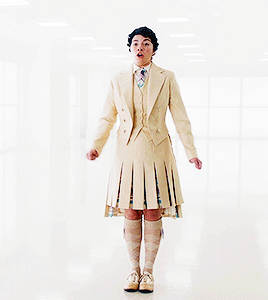
Before I get started I just wanted to say they were the reason I almost threw this all away because of their color combinations but I think I pulled it around
So lets just get into this - they are wearing a tan outfit and have a very similar tartan to Saraqael with the purple, the blue-green, and a dark gray.
This color combination with the tan and this kind of tartan really threw me for a loop. Why would a protective kind of angel be doing these jobs? So I went looking into actual u.k. military rankings because I didn't know anything about them and tried to find out what the lowest ranking members did. And one of the jobs of a lance corporal is a clerk which rung the bell that they also say they are a Scrivener, which is also a clerk.
It has been theorized that they work under Saraqael which seems to be reflected with the tartan. But what their actual job seems to be is writing down and recording these agreed upon Second Coming plans, yknow War plans and filing them. (also looking back there seems to be a very light shade of gray stripe in the tartan - almost like it is faded - maybe a visual hint they were demoted)
I also think it is interesting they sent another protective angel who has a love for written word down to Earth and eventually ends up staying. Only this time they have the complete knowledge of what Heaven is planning even if they don't realize it - they were the one who wrote it down.
The Metatron
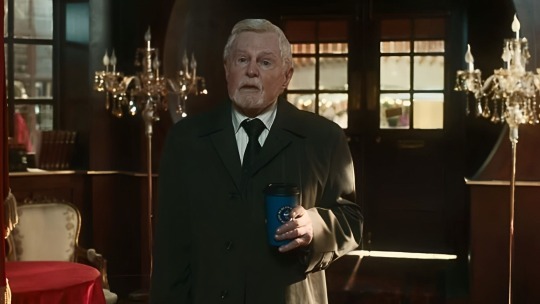
Yes we are going to end with him because I guess he deserves a mention. No but seriously his outfit is interesting and hard to read particularly - mainly because it is very difficult to find good pictures - so I don't have a lot of clear cut answers for him and most of this is speculation I guess you could say but I figured I had to include him. His outfit consist of black long coat, pants, and tie with the addition of a blue flower?? shape on it, and a white shirt with blue vertical stripes underneath.
Now he is the only angel we see wear black as the base color in their main outfit - the only other time is Aziraphale’s magician outfit - which has interesting implications of this color - is it a mystery? An illusion? He also seems to have influence over the darker colors we see in heaven, as Saraqael is the only angel we see recognized him. But since I don't have an answer for that so let’s move on to the blue.
I go back and forth on whether this is the same blue that I talked about earlier or just like a generic blue - either way they both kind of boil down to the same thing for Heaven - and that is that Heaven is going through a change. Most of the time when we see blue it is with Aziraphale who we see change a lot for an angel and we see him start to include shades of blue in his outfit in 1601 (though I could see an argument for 537 a.d.) We also see Heaven itself go from a warm yellow undertone and change into the cool blue undertone at some point. And if you think this Second Coming isn't going to involve a big change in Heaven - well have fun. It is also the color Jesus is draped in on the Resurrectionists sign. But anyway lost the plot a little there - my point is that the Metatron seems to like to change things into his favor.
Remember when I said I'd get into the Metatron and his connection to fours well lets get into that now. In the design of the blue parts of his tie their seems to be four sides to it and it got me thinking other fours we see. Another instantance of fours directly related to the Metatron is right before he appears in season 1 four lights float down and when they connect then boom Metatron head. Now on to more nuisance fours and you get that they have a running theme that one of them is off, Adam - the only non-human in his for person friend group, Pollution - pestilence’s replacement, and most importantly the forth archangel pushed up into the archangel council. The thing is without the insistance there be four of them the rankings in heaven would fall into a pretty pyramid scheme - a perfect three one of Gods favorite. But I've probably rambled for far too long about this and it’s getting into other things so I'll leave it here.
So just to summarize what the colors mean
White - is for our base angels that are meant to surveillance
Tan - is for our base angels that are meant to protect
Gray - to show archangel rank - gray suit is for the council
Purple - is a job type for intelligence/legal dealings
Blue-Green - is a job type specifically for planning the Second Coming
Blue - just meant to symbolize change in heaven/angels
Black - just sus - it's a mystery - hiding something
#bless the costume department#i was writing this while in line for a ptv concert#good omens#good omens 2#good ineffable omens#good omens meta#good omens analysis#good omens angel costumes#costume analysis#aziraphale#good omens gabriel#good omens michael#good omens uriel#good omens sandalphon#good omens saraqael#good omens metatron
67 notes
·
View notes
Note
Your metas are keeping us all well fed, thank you very much. I have some chocolate tea for you? And homemade vegan cookies if you like.
What do you think about Crowley's "Can I watch?" he could have just said "can I accompany you?" or "do you mind if I tag along" or "I wanna see this"...
Allo, @procrastiel! Ya know, I've never had a chocolate-based tea! I would definitely be down for trying it. Thank you. 💕

In the scene you mentioned, Aziraphale is about to go around the neighborhood to tempt the Whickber Street shopkeepers into coming to The Meeting Ball. The meeting is scheduled for 6:30pm later that day, which is a Thursday. No one is going to want to go to the irritating work thing at this point in the week. Our introverted bookseller knows as well as anyone that half the street is planning on bailing on this thing. He can't have that happen. He has everything riding on this party. Both Crowley and Aziraphale know that Aziraphale is going to have to be persuasive to get these shopkeepers and traders to play ball and that some temptations are in store here.
Crowley is dryly asking if he can watch Aziraphale perform some temptations on the Whickber Street people because of how they use magic-related language euphemistically. He's joking that he would enjoy watching Aziraphale persuading the neighbors to come (heh) to the meeting because of how much he enjoys watching Aziraphale, err... perform temptations.

It's a joke on The Serpent always being down to, as he was eager to do in Lockdown, slither over and watch Aziraphale eat cake, ifyaknowwhatImean. He also, as we know, enjoys watching Aziraphale eat literal food.


The other layer to "can I watch?" is that the word watch means to stand guard and that is also what Crowley is doing while going around the neighborhood with Aziraphale in this scene. With angels and Shax sniffing around the shop, Crowley wants to be sure that no one bothers Aziraphale. R.P. Tyler should consider upgrading his idea of Neighborhood Watch, as he might be a lot happier approaching it the Crowley and Aziraphale way.
The original meaning of watch across several languages was actually in relation to the word wake and being awake. It referred to someone keeping watch, in the military and also on any manned ship, naval or otherwise. So, this is also a subtle sea/fish reference. Watch also originated from the unfortunately (as it is fun to say) obsolete Middle English phrase "wacches of wodnesse", which meant to stay awake throughout the night for "purposes of debauchery."
Crowley is seen in both seasons referring to this and spending time alone together at night a lot to keep their relationship a secret as their nightlife, as in this scene below when he's phrasing what he's saying in a coded way that is for Aziraphale's benefit. It's also part of of the wordplay in nightingales being descriptive of both their word-origin-happy hidden language and their romance as a whole. (Adding to the joke is that they were both, once, knights.)

But there is another word that connects to watch that Crowley and Aziraphale are playing around with in different scenes and that word is wait.
The word wait (and, so, waiting and waiter) comes from the Anglo-French waitier, which actually meant to watch. Phrases like to lie in wait come from this connotation of wait as being to watch with intensity and/or intent.
Crowley and Aziraphale play with watch/wait in a couple of different scenes. In Lockdown, they are also using watch in the sense of a timepiece/the alarm clock alongside the idea of Crowley waiting by bringing drinks and slithering over to watch Aziraphale eat cake. We'll look at Aziraphale using wait in the Marguerite's scene in a second. The joke for them is that the etymology of these linked words is also their own history together. It's this, basically:

In the Job minisode, Crowley waits on Aziraphale by "tempting" him with food on a tray and is pretty clearly getting off on watching Aziraphale eat. The first foray towards sex for them were the parasexual ox ribs in Job's cellar. Half the reason why we rarely see Crowley eat in the series even though various scenes and the book tell us that he does is because the food-is-food-but-food-is-also-sex metaphor means that they are using scenes between Crowley and Aziraphale involving food and drink to tell us about their relationship. The scene at The Ritz in 1.01 is the best example of this:

We learn so much more about them, individually and together, just by coming in on them on Aziraphale's last bite of dessert than we would have if it was structured differently and if Crowley happened to have been eating during this scene.
Aziraphale also plays with watch/wait in the scene at Marguerite's, winning at innuendo forever when he uses the above definitions but then also uses the meaning of wait that is related to allowing time to pass in anticipation of an eventual outcome when suggesting that Crowley wait in the bookshop.
You know, the place that is also euphemistically Aziraphale...

It's also present in the humor of Aziraphale throwing this whole Meeting Ball with Crowley in mind and so having the guy they've been terrified of for ages, whom they worried would be watching too closely and discover them (and who has really known forever) circling around with a tray of temptation tiny dinners, waiting on the entire neighborhood.

If you're theorizing and want to take it one step further into the story as a whole and not only on the level of Crowley and Aziraphale using this language between them?
2.05 is the start of the end of S2 because it is putting the bookshop attack into motion and that plot then carries over from 2.05 into 2.06 and leads to The Final 15. 2.05/2.06 is really like one, long episode. That culminating episode of the story begins with Aziraphale going around and successfully tempting the Whickber Street humans, with different levels of it needed, depending on the level of resistance with which he is met. Crowley goes with him, watching, right?
Now, jump to the much darker, nightmarish end to the season that all of that helps set up...

...where Crowley is quite literally forced to watch as Satan shows up to the business that is the bookshop to wait on and tempt Aziraphale... and then watches through the window as Aziraphale and Crowley temporarily implode.

#aziracrow#ineffable husbands#good omens#good omens meta#good omens 2#crowley#aziraphale#ineffable husbands speak#etymology
33 notes
·
View notes
Text
I’ve yet to see anyone talk about this:

The verse on the matchbox being highlighted so obviously stuck out to me. Neil is clever. He did this for some reason. I looked into this a while ago but only just got round to writing it out because I’ve been sick and had the time to hyper fixate on researching something I didn’t need to…
So buckle up because Job 41 is a parallel of the minisode scene when God is talking to Job. But I think the whole of Job 41 relates heavily to Crowleys character and his storyline because it’s about a sea snake.
Full warning this post is long, but it’s all important I promise.
Disclaimer you have to read if you’re gonna comment about me being wrong in my interpretation of Job 41: I am someone who doesn’t believe it’s possible to perfectly understand the bible. I’m not presenting anything as fact because there’s looottts of different interpretations of literally everything in the bible. This is my interpretation of the chapter. I don’t care if you think I’m wrong cause you have a double degree in know it all religious studies. Disclaimer over.
So where does the verse come from?
Job 41:19
‘Out of his mouth go burning lamps, and sparks of fire leap out’
This verse is part of Gods description of a leviathan that takes up most of the second part of chapter 41 in the book of Job. If you want to read the entire chapter before reading this I’ll paste it at the bottom of the post. It’s from the King James version. You can also just google it.
But what’s a leviathan? Glad you asked. I spent to long looking it up.
Leviathans. The general consensus is that the creature referred to in Job 41 is some kind of sea monster. The Hebrew word that translates to Leviathan (Livyatan) appears six times in the Old Testament. One of them is in Job 41. The word is derived from the root Iwy or ‘ twist, coil’ and means ‘the sinuous one.’ So I think we can establish that this creature is at least indicated to be snake-like. It could be a crocodile, a whale, a dragon, a snake, or just an indescribable monster. But we have no modern reference because this creature doesn’t exist in modern times if it ever existed at all. So for the purpose of relating it to the show, I think its important to note that one of the interpretations is that the leviathan is a snake like creature or a sea serpent Iike what’s shown in this beautiful piece of art.
The Destruction of Leviathan by Gustave Doré (1865)

Now, these two verses from the first part of Job 41 are important,
Job 41:10
None is so fierce that dare stir him up: who then is able to stand before me?
Job 41:4
Will he make a covenant with thee? Will thou take him for a servent forever?
Prior to chapter 41 Job, has been questioning God about the mysteries of creation. God responds by chastising Job for questioning him and describing how Job would not be able to subdue the great leviathan and make him his servant, so why does he think he has a right to question god?
And in our minisode Job comes back from talking to god and says:
“I think the point was, if you want answers, come back when you can make a whale.”
What’s happening when Azirpahale and Crowley come across God talking to Job is exactly what’s happening in Job 41. I also noted that in the minisode Job said God talked alot about whales. Which is funny, because it seemed random at the time, but one interpretation of the ‘leviathan’ is that it’s some kind of whale.
So that scene in the minsode is based off of Job 41! Amazing. But I don’t think the connections end there…
The more obvious potential reference to Crowley in Job 41 is how God describes the leviathan being able to spit fire. The verse on the matchbox comes from this part of the chapter.
Job 41:19
Out of his mouth go burning lamps, and sparks of fire leap out
Job 41:20
Out of his nostrils goeth smoke, as out of a seething pot or caldron
Job 41:21
His breath kindleth coals, and flames goeth out of his mouth
We know Crowley has the ability to summon fire. He summoned that giant sun thing that shoots fireballs to smite goats at the start of the minisode, then he sets fire to the house before saving Job’s children. So leviathan/sea serpent spits fire, our fav snake from Eden can summon fire. Fire is also just quite central to his storyline with the bookshop fire, the road/his Bentley setting fire, Heaven trying to burn Aziraphale with fire and the bombing of the church when he saves Aziraphales books.
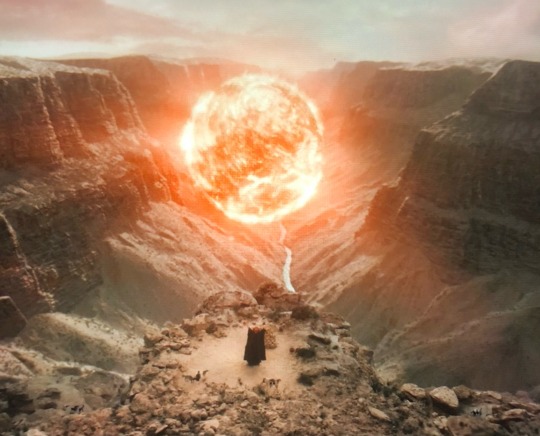
But there’s some less obvious connections in Job 41 to Crowley. There’sa few interesting verses here that seem to relate to Crowley
Job 41:4
Will he make a covenant with thee? wilt thou take him for a servant for ever?
God isn’t talking about killing the leviathan, he’s talking about enslaving it
Job 41:24
His heart is firm as a stone: yea, as hard as a piece of nether millstone
Nether millstones, according to my googling, are millstones obviously, but it’s also a phrase that indicates something that is tough and unyielding, unlikely to submit. It’s describing the leviathan being unyielding to negotiations. God also says this about the leviathan,
Job 41:29
Darts are counted as stubble: he laughter at the shaking of a spear
I couldn’t help but think all these verses are very Crowley sounding. He is stubborn and willfull, unable to be controlled and won’t submit to servitude. He (both actually and metaphorically) laughed in hell's face when he and Aziraphale were body doubling and the holy water didn’t destroy him.
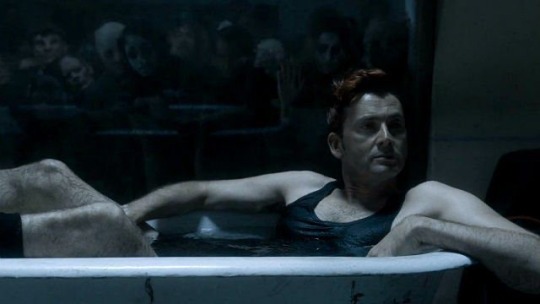
Crowleys wilfulness and refusal to be subjugated is the reason he fell in the first place. It’s the reason he fell out with Hell as well, he refuses to fully go along with either side. He believes in autonomy and freedom. He said no to Aziraphale because he cannot return to a life he perceives as slavery, especially as Aziraphales ‘second in command’. He doesn’t want to be under anyones command or to command anyone. It’s so against his very nature to return that the suggestion was ridiculous to him. And this chapter of Job is a parallel in that God uses the leviathan as an example because it’s ridiculous to imagine a giant sea monster being enslaved by a human to do his bidding. Just like in the minisode how it’s ridiculous to tell Job to make whales before he can ask God anything.
But that’s the point. That’s the whole conflict of the show, Gods ridiculous answer to everything is that it’s ‘ineffable’ and therefore you can’t ask questions.
I also think it’s also fitting that the leviathan is perceived to be a monster that must be slain or enslaved.
And it makes me think of how Crowley has always been labelled as evil because he fell. I think of how, at heart, he is truly gentle and kind, he’s a starmaker. But his fall, his appearance, his desire to be autonomous and his grey moral campus make him feared and a target. He’s a boat rocker, he keeps asking questions even when he gets told ridiculous answers and that’s the problem for those in power. It makes me think of this quote
“Draw a monster. Why is it a monster?”
-Daughter by Janice Lee.
So in conclusion, not only is Job 41 the chapter that would’ve inspired the scene where Job is talking to god, I think Crowley represents the leviathan being discussed in Job 41.
So do I think this has any meaning/hint to season 3?
I don’t think there’s a direct hint. But it reminded me that Crowleys character is truly unrelenting. He’s a nether millstone. And he won’t give up that easily. He absolutely won’t submit to anyone, and he’s shown time and time again that his blustering about running away disappears as soon as someone or something he cares about is in danger (ie Aziraphale). And the second coming will also threaten his creation (the universe) so I’m really hoping we will see so much more of Crowleys power and history in S3.
I’m really happy I looked into this, because I could be completely off the deep end with this analysis but it actually wouldn’t even matter because this universe Terry and Neil’s created is built around it being transposable. You can put any lens you want on it. And I had fun deep diving into Job 41. I never thought I’d ever say I had fun reading the bible but Neil you did it. Sneaky buggar.
Full chapter of Job 41:
41 Canst thou draw out leviathan with an hook? or his tongue with a cord which thou lettest down?
2 Canst thou put an hook into his nose? or bore his jaw through with a thorn?
3 Will he make many supplications unto thee? will he speak soft words unto thee?
4 Will he make a covenant with thee? wilt thou take him for a servant for ever?
5 Wilt thou play with him as with a bird? or wilt thou bind him for thy maidens?
6 Shall the companions make a banquet of him? shall they part him among the merchants?
7 Canst thou fill his skin with barbed irons? or his head with fish spears?
8 Lay thine hand upon him, remember the battle, do no more.
9 Behold, the hope of him is in vain: shall not one be cast down even at the sight of him?
10 None is so fierce that dare stir him up: who then is able to stand before me?
11 Who hath prevented me, that I should repay him? whatsoever is under the whole heaven is mine.
12 I will not conceal his parts, nor his power, nor his comely proportion.
13 Who can discover the face of his garment? or who can come to him with his double bridle?
14 Who can open the doors of his face? his teeth are terrible round about.
15 His scales are his pride, shut up together as with a close seal.
16 One is so near to another, that no air can come between them.
17 They are joined one to another, they stick together, that they cannot be sundered.
18 By his neesings a light doth shine, and his eyes are like the eyelids of the morning.
19 Out of his mouth go burning lamps, and sparks of fire leap out.
20 Out of his nostrils goeth smoke, as out of a seething pot or caldron.
21 His breath kindleth coals, and a flame goeth out of his mouth.
22 In his neck remaineth strength, and sorrow is turned into joy before him.
23 The flakes of his flesh are joined together: they are firm in themselves; they cannot be moved.
24 His heart is as firm as a stone; yea, as hard as a piece of the nether millstone.
25 When he raiseth up himself, the mighty are afraid: by reason of breakings they purify themselves.
26 The sword of him that layeth at him cannot hold: the spear, the dart, nor the habergeon.
27 He esteemeth iron as straw, and brass as rotten wood.
28 The arrow cannot make him flee: slingstones are turned with him into stubble.
29 Darts are counted as stubble: he laugheth at the shaking of a spear.
30 Sharp stones are under him: he spreadeth sharp pointed things upon the mire.
31 He maketh the deep to boil like a pot: he maketh the sea like a pot of ointment.
32 He maketh a path to shine after him; one would think the deep to be hoary.
33 Upon earth there is not his like, who is made without fear.
34 He beholdeth all high things: he is a king over all the children of pride.
#good omens#crowley#good omens analysis#aziracrow#aziraphale#crowly x aziraphale#good omens s2#good omens season 2#ineffable husbands
107 notes
·
View notes
Text
Good Omens Theory: Matchbox Foreshadowing

Did anyone wonder why there was so much emphasis on this matchbox?
We know that it was later connected to Gabriel's disappearance since it's from The Resurrectionist in Edinburgh, and it's where he stored his fly from Beelzebub. The Resurrectionist, of course, was a double entendre to the body snatchers that were an essential part of Victorian medical research as well as Jesus himself. Knowing at the end of the season that Heaven is planning the Second Coming, all the references to the Resurrectionist seemed like some pretty basic foreshadowing. But I think it goes deeper than that.
THE QUOTE
Why is there a quote from the Book of Job on a matchbox from a place named after Jesus? Surely, there would have been other scripture that was more relevant to JC. No, instead we get this from the book of Job.
Job 41:19 Out of his mouth go burning lamps, and sparks of fire leap out
Upon the first watch, the first thing that immediately sprung to mind when that quote floated on screen was the last time fiery sparks leaped out of someone's mouth in Heaven. Who did that again?
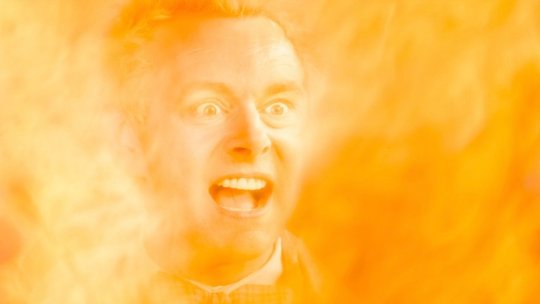
Oh yeah!
Crowley, wearing Aziraphale's face.
I've always wondered exactly what the relevance of this particular quote from the Book of Job meant. After all, references to The Book Of Job were everywhere in season 2. There are some excellent metas out there as to why Job is so important to season 2, but I want to actually analyze what the scripture that's been referenced is describing.
The whole point of the Book of Job is most of it is about God's conversation with Job. Chapter 41 is titled: The Lord's Power Shown in the Leviathan. And I really don't think that is a coincidence.
The Leviathan, as described in Chapter 41 of the Book of Job... is a giant snake that breathes fire. Literally.
Basically, God is talking to Job about all of their creations, and they bring up The Leviathan as one of the most fearsome things they ever created. It's basically God saying to Job: look at my big scary sea snake that breathes fire. Do you think you can fight this big scary sea snake that breathes fire? You can't. He's so powerful. No weapons can harm him. He's stronger than anything. Everyone's terrified of him. But he's not more powerful than ME because I'm God.
So where else does the Leviathan appear in theology?
In the Book of Enoch, The Leviathan is a female giant chaos serpent that lives deep in the ocean, while her mate, Behemoth, is a male giant chaos beast (based off of a hippopotamus or water-ox) who lives in the mythical desert of Duidain, East of Eden.
In the Book of Revelations, The Leviathan is associated with The Devil (a lot of things get associated with the Devil in Christianity. Read my Crowley isn't Lucifer, But... theory for more context). It is also strongly associated with being The Serpent of Eden ("this is the dragon that was cast out of Paradise, that beguiled Eve and is permitted in this world to make sport of us" - Jerome of Stridon), aka our good friend Crowley. In the prophecy of Revelations, the Leviathan, also known as The Seven-Headed Dragon, is kind of important in the final battle between Heaven and Hell.
So, I think Crowley is The Leviathan, and he's going to have a much more important role in the Second Coming than he thinks he does.
The Resurrectionist(s).
I think Season 3 is going to be a biblical zombie apocalypse.
Let me explain.
In the Episode 2 Minisode, we see Aziraphale find out that God is going to let Satan destroy everything Job owns, including his children. Aziraphale thinks killing children is wrong, so he tries to stop Crowley from killing Job's children, only to find out, surprise! Crowley never planned to kill the children and was always scheming behind Hell's back to find a way to protect them. Aziraphle helps Crowley by working together to trick Heaven into thinking Job's old children are dead and they have new ones now, saving the children's lives.
In the Episode 3 Minisode, we see Aziraphale and Crowley get involved with a body snatcher named Elpseth. Aziraphale thinks digging up corpses for money is wrong, so he stops Elpseth from selling the body to a resurrectionist, only to find out, surprise! The medical community actually really needs these human corpses to study anatomy and potentially reduce human suffering. He tries to help Elpseth dig up another body, but Wee Morag gets shot and killed, and Crowley stops Elpseth from killing herself with Laudanum by drinking it instead and makes her agree to live a better life.
In the Episode 4 Minisode, we see Aziraphale and Crowley flirt do a little magic show together so Aziraphale can repay Crowley for saving his books by doing a West End show to cover Crowley's alcohol smuggling debts. Meanwhile, there are literal zombie nazis who have been hired by hell to try to find evidence that the two of them are working together. Aziraphale and Crowley trust each other when their miracles aren't working, and they pull off the magic trick. Backstage, when Furfur rubs the proof in their faces, Aziraphale tricks him by doing sleight-of-hand so Furfur returns to hell without proof.
In the minisodes, we see several consistent themes popping up. We see Aziraphale struggling with morality. We see Aziraphale and Crowley working together to help humanity or each other. We see them saving human lives at great personal risk. We see deception and sleight-of-hand against Heaven, Hell, and Humanity. Lastly and most importantly, we see a lot of death and resurrection. We see the not-death and not-resurrection of Job's children, the deaths of resurrectionists of Victorian Scotland, and the literal death and resurrection of the Nazi Zombies.
Outside of the minisodes, we see Crowley and Aziraphale's combined miracle be worth 25 Lazarii, aka bringing 25 people back from the dead. We see Gabriel, in his purple-eyed prophetic trance, warn of a great storm that will raise the dead. And we see Crowley bring a man who was ripped apart by demons back to life(?).
Not to mention we know Jesus, The Resurrectionist, is going to be around for season 3. And the Second Coming, aka Judgement Day, is going to happen. And the Last Judgement in Abrahamic Theology is the Day of Resurrection; it is "The Resurrection of the Dead, both Just and Unjust" (Acts 24:25); it is Life to the Dead so they may live eternally in the Kingdom to Come. (That's why, in Abrahamic Theology, the Book of Life is so important. You can see my Book of Lies theory for more on that).
The dead are going to rise. It is established that it's possible for the dead to become zombies with the nazi zombie episode. Why devote an entire minisode to the concept of zombies if it isn't important? It's foreshadowed time and time again throughout season 2.
I also anticipate that we're going to see the other themes that were present in the minisodes. I don't think anyone will be surprised if next season Aziraphael will struggle with morality. Aziraphale and Crowley are going to have to learn to communicate properly so they can work together and trust each other again (being able to do miracles of immense power together is a huge Chekov's Gun). We're going to see them do some kind of deception again to trick Heaven and Hell into thinking they're getting their way with the apocalypse when they actually aren't.
In Summary
So, in conclusion, based on that little matchbox and the wider plot of Season 2, we're going to see Crowley be the giant fire-breathing chaos serpent, aka Leviathan (literally or metaphorically), with some kind of essential role at the end of the world. And I think we're going to see a zombie apocalypse or mass resurrection of some sort. I also think we're going to see Aziraphale and Crowley have to learn to trust each other again so they can do A Big Miracle and also trick Heaven and Hell with some really clever deception.
#good omens#good omens theory#good omens meta#crowley#aziraphale#ineffable husbands#good omens spoilers#gos2 spoilers#good omens season 2#good omens season 1#the job episode#the grave episode#the nazi zombie episode#good omens season 3 predictions#book of life
145 notes
·
View notes
Text
Before the Beginning (part 1.4.)
Part 1.1. | Part 1.2. | Part 1.3. | Part 1.5. |
Part 2.1. | Part 2.2. | Part 2.3. | Part 2.4. |
Yes, hello, I have another scene I'd like to analyze.
It's the one in the Companion to Owls minisode, when Aziraphale and Crowley (and technically Job's kids in the form of three newts in a pot but I think we can ignore their presence) are in the basement waiting out the storm. They're relatively relaxed - the angel gorging on ox ribs and the demon enjoying his wine - and have a very interesting conversation.
Here's the whole thing:
A: Come on, you're a little bit on our side. C: Not even the littlest. A: Well, you're not on Hell's side. C: I go along with Hell as far as I can. A: So, whose side are you on? C: My side. A: Gosh. Well, that sounds... C: What? A: Lonely. C: Lonely? No, not lonely. Whose side are you on? A: God's, of course! C: Oh, really? The same God that wants me to whack the kids? A: Yes. But... C: Yeah... That's just how it started for me. See you in Hell.
What I want to address today isn't anything new, but it needs to be written. At least so that you knew where I stand. Anyway, it's no less exciting for being widely discussed already. I mean, is any of us tired of digging into the concept of sides? No, didn't think so. Having our boys talk about it, and so explicitly too, will never not be a treat and never not worth another meta.
So here I go: yes, I do believe Aziraphale is heavily misguided and confused about the whole thing, and it's the root of many issues in both seasons.
This whole exchange is a perfect example.
God had an argument with Satan about whether Job's faith was conditional. The man was exceptionally devoted but so far he experienced nothing but good fortune. But what if he didn't? What if he had to suffer the loss of everything he cared about?
They decided to find out.
Hell wanted Job to fail. To crack under all the misery and renounce God. Heaven... it's hard to tell really. I guess Heaven wanted Job to remain faithful so that God could win the bet but I think if he failed and needed to be punished it wouldn't be so terrible either.
What is crucial, however, is that both sides wanted the test to happen. They both wanted Job to suffer so they could see what happens.
Aziraphale knew it. But despite knowing it, despite all the facts staring him in the face, when Crowley had saved the lives of Job's goats and Job's children, it somehow led Aziraphale to the conclusion that the demon is still on Heaven's side. It really couldn't have been any plainer how skewed the angel's perception is because such deduction had never been more of a stretch than it was in that particular instance.
I believe there are two assumptions that Aziraphale clings to that cloud his judgment so much.
The first is something that many people in the fandom have pointed out already - Aziraphale conflates and confuses goodness, Heaven, and God. It's not a perfect equivalence, obviously, but the distinction is muddled.
The second assumption is that there are two opposite camps and everything that exists belongs to either one or the other. Yes, Aziraphale's thinking is extremely binary, and we should never forget about it. Sometimes it isn't just about good and evil for him; sometimes it's simply the inability to imagine third space.
When Aziraphale claims Crowley is a little bit on Heaven's side, we can see both assumptions at work.
#1: Crowley must be a little on Heaven's side because he had done something unquestionably good - he saved Job's goats and children - and being and doing good makes you affiliated with Heaven by default.
#2: Crowley must be a little on Heaven's side because he didn't do what Hell wanted - kill Job's goats and children - and opposing Hell is the same as endorsing Heaven.
The latter is also evident in Aziraphale's reaction to Crowley's denial - he points out Crowley is not on Hell's side as if it proved anything because in his mind it does - and confusion when Crowley tells him where he sees himself standing.
It doesn't help to see flaws in that logic that most of the time Aziraphale applies it to Crowley but not to himself. We may scoff at it but I actually find it understandable. Not logical, obviously, but easy to empathize with. Thinking that Crowley is still good and belongs with Heaven in some way is hardly a troubling thought. But contemplating the analogical idea that if Aziraphale himself doesn't do what Heaven wants then he might belong with Hell is downright terrifying.
It does come up at the end of the basement scene.
Crowley draws Aziraphale's attention to what the angel was avoiding - that God wanted Crowley to "whack the kids". Crowley wasn't defying Hell any more than Aziraphale was defying Heaven. When Aziraphale hesitates, seeing how perhaps doing what God wants and doing the right thing might not be the exact same thing here, Crowley points out this is how it started for him. That's exactly how you depart from Heaven, and if you depart from Heaven you end up in Hell.
We can see how it starts dawning on Aziraphale, and how he immediately pushes that extremely unpleasant thought away and goes back to his ox.
But he does face it in the end, in the heartwrenching finale of the episode. And what he's told? That nobody needs to know and nothing has to change. He is basically encouraged not to think about it. So he doesn't.
It's all too painful for either of them to discuss further so they leave it at that, allowing each other to fit what happened into their respective worldview, and make assumptions about each other.
There's much more in that scene but I'm going to bookmark it for a later date.
I hope to conclude part 1 in the next post. Wish me luck and inspiration!
#good omens#good omens 2#good omens meta#crowley#aziraphale#post series#before the beginning#companion to owls
35 notes
·
View notes